SOAS CIS-Nohoudh Muslim Integration Conference 2015: Engaging with the Discourse (Summary of proceedings)
Nohoudh Muslim Integration Conference 2015:
Engaging with the Discourse
Note: below is a summary of proceedings from the 2 day conference on Nov 5-6th 2015
The hashtag for the event was #SOASMIC
You can also watch a snippet of proceedings on this video
Thursday 5th of November
Welcome address and Introduction:Muhammad Abdel Haleem (MAH) (Director, Centre of Islamic, SOAS) and Fahd al-Zumaei (FZ) (Nohoudh Endowment for Development Studies)
Myriam Francois welcomes the crowd to the conference and introduces MAH. MAH praises FZ for making this conference possible, explaining the inception of this entire project as coming for his concern for Muslim integration in Britain.
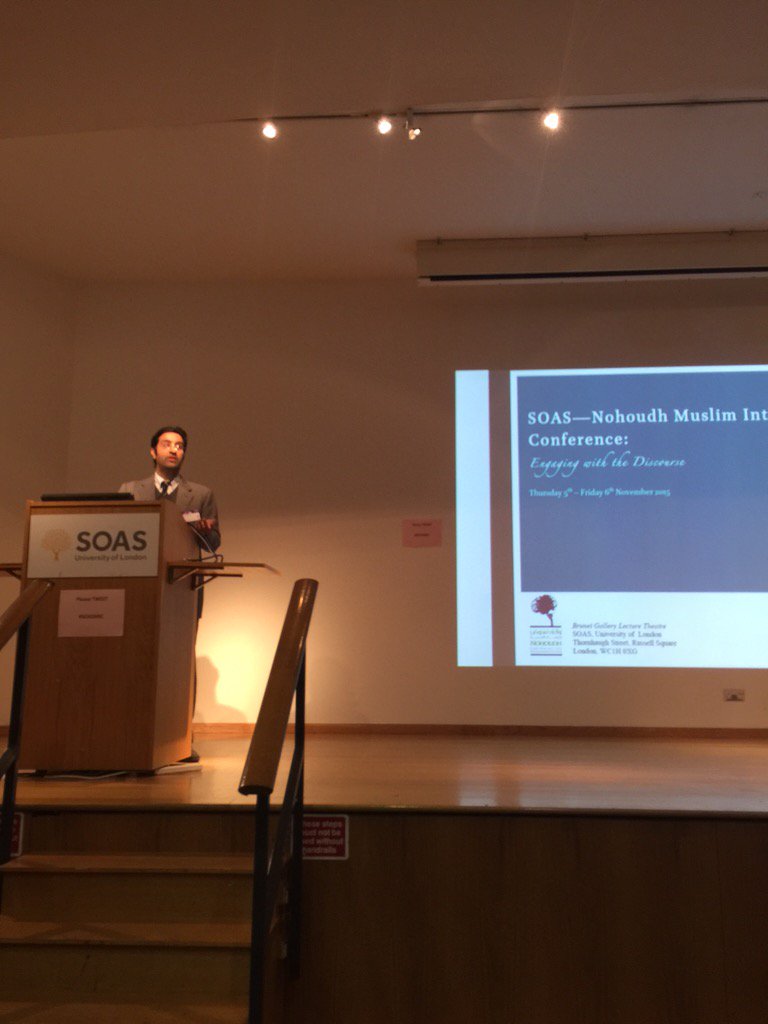
Other projects have been absorbed in this Project, and they will also be contributing to this conference: “Curriculum for Cohesion”, for example.
FZ comes to represent the Nohoudh Foundation and explains that this project began with his concerns regarding Muslim integration in the UK. The first phase of the programme would be to grant scholarships to British born Muslims to approach the issue of integration from different perspectives: political, legal, values, etc. The goal is for these individuals to play an active role in the community and be a valuable asset to Britain’s multicultural community.
FZ emphasises that Islam has traditionally fostered integration. Seeing as the Western world does so also, it should be the case that both worlds should be able to live comfortably with one another. There are of course two main camps who argue that integration is not possible: unsavoury or radical Muslims, and a certain portion of the non-Muslim British population. The idea is to not let either of these groups lead the integrative narrative.
The hope is that the academic work done here will translate into policy changes and have a beneficial and practical impact on society.
Muhammad Abdel Haleem (Director, Centre of Islamic, SOAS), The Shari’ah and ‘Integration’.

MAH talks about the difference between assimilation and integration. His hope is that Muslims are integrated, being good Muslims and good British citizens. The Qur’an supports Muslim integration in non-Muslim societies. For example, the Qur’an confirms, 18 times, that is was revealed to confirm the books that came before it. The 10 commandments apart from the Sabbath, and also all the teachings of the Sermon on the Mount are present in the Qur’an, and these are familiar to the Judeo-Christian context. One cannot be a Muslim and be isolated and detest others. The Qur’an says that God created all people from one man and woman, then made them into nations and tribes so as to get to know one another and to co-operate with one another in what is good. The Prophet (p) also said that, the best people are those who benefit others the most. Citizenship is part of a contract by which a citizen lives under a society and enjoys its services, while being loyal and cooperative. This should be the intention for British Muslims – never to fight against the hosting country. Some misinformed Muslims think Sharia laws should be brought to the UK. But nowhere does the Qur’an claim that Muslim law should be imposed on non-Muslims. In fact, it urges people of the book to judge by their own scripture.
Sharia is much more than its penal system, yet people seem to think that is all it consists of. MAH has done a study showing that out of 6236 verses in the Qur’an only 30 verses deal with the penal system, and even here, there is mercy due to the general desire of the revealed law to see people repent and mend their ways and therefore escape punishment.
Islam, he claims, is the religion of integration with others. Muslims have the right to live in the UK without discrimination, and this is what justice, common sense and integration demand. MAH claims that it is really in the interest of British citizens that Muslims understand the proper teachings of the Qur’an and live according to them..
Ifath Nawaz (AML) Shari`ah in the UK: Dispelling the Myths

Ifath Nawaz (IN) talks about the discussion of Sharia law in the context of the UK Justice System. People are at best generally very cautious, and, at worst hateful of the idea of Sharia Law in the UK. There is a ‘hysteria’ regarding Sharia, claims IN. A couple of definitions are offered of Sharia Law from the Oxford dictionary and Encyclopaedia seeming very strict and rigid. Another definition is given from Tariq Ramadan which is very different in tone, highlighting its humanity and moral ethos.
Do Muslims follow the Sharia in the UK? If they avoid alcohol, eat halal, pray and fast, then they are indeed practicing the Sharia. It is an all-encompassing way of life. There are some Muslims however, who push for a more extreme application of what they believe is the Sharia.
If Muslims are practicing Sharia (and they are) then does this mean they are trying to change the society? No. They are simply enjoying the right that people have right to freedom of thought, choice and religion. These rights must be respected. 85 Sharia councils around the UK, like the Jewish councils offer advice to Muslims, though there is a concern that these are trying to run a parallel legal system in the UK. A study found that ultimately, religious tribunals work within the context of civil laws. However, there are concerns about the treatment of women which IN concedes is justified.
There are government policies like Prevent which seem to encourage scaring Muslims from basic practices. Who is to determine when a Muslim is too Islamic and extreme? This is worrying for the Muslim community. Counter-terrorism focuses on Muslims and does not look at the root of the issue. This dynamic needs to be criticised.
British Muslims aren’t seeking to bring Sharia to the UK, Muslims just want to be able to practice their faith in peace without discrimination.
Keynote Lecture: Trevor Phillips (Writer and broadcaster), Integration in the UK: A More British Muslim, A More Muslim Britain
MAH introduces Trevor Phillips (TP) as the Keynote speaker.
TP starts with gratitude for being present. He is known for being the Chair of Human Rights Commission. Today we’re talking about integration but wider issues as well. How do we live together? British people coming together from different backgrounds is what makes Britain what it is.
1 in 10 people in Europe will be Muslim by 2050. There is currently a 13% Muslim population in the UK and this is expected to be 25-30% by 2050. This topic holds personal significance for TP as he has grown up with great diversity for much of his life. He learnt that integration is not an automatic human response to diversity. It’s a learnt phenomenon. Integration is also a two-way street. It needs effort from both sides. He also learnt that things unrelated to people’s culture eventually come down to skin colour. UKIP, for example, bring their concerns down to their skin colour.
Isiah Berlin said restless humanity would have to find new ways of living together graciously. Tolerance has come to imply a grudging acceptance of living together. There is a parallel to be made with the persecution of Roman Catholics, who were also tortured. We don’t want to see the same thing here regarding Muslims. When TP says integration, he doesn’t mean a flattening process of assimilation; rather he sees it as a process of convergence on a single set of values. It should be the case that skin colour and features shouldn’t determine one’s assumption of where you work, for example.
Well-off societies are enjoying more freedoms and better integration. We are less likely to see bigotry now in the UK. 20 years ago, most people expressed discomfort on having a black or Asian boss. Now hardly anyone thinks this.
A study shows that British Muslims are 40% less likely to rate their GPs as very good. How do we address this? There are also concerns about the behaviour of police. We are learning that integration can be learnt by non-legal approaches as well.
Culture and manners are important for the topic of integration. For example, should people wear the Red Poppy? How do we influence the way we behave and relate to each other? We also need to be more explicit about our rules of behaviours. For example, what causes offence? We should accept offence as a part of a free society. Cultural and ethnic preferences factor in.
Standards of achievement at 16 are rising in the UK. Different ethnic groups do differently. One consistent finding is that there is a 20% gap between the poor and the average. The exception is the Chinese. They are up to speed regardless of the wealth and class. So what do they have that the rest of us do not? And can we copy it? How do we encourage a shared future? White and Pakistani boys do badly too. If we can understand why this is, we might be able to find out more about how to better assist integration.
Panel 1: ENGAGING WITH THE INTEGRATION DISCOURSE
(CHAIR: Ifath Nawaz)
Omar Khan, Integration and British Muslims: The Need for a Wider Agenda
Usama Hasan, Hurriyah, musawah, ukhuwwah: Islam and Discourses of Integration
David Goodhart, What Does Integration Look Like in a Liberal Society? Why Does it Matter? And is There a Special Muslim Issue with Integration?
Christopher Bagley, The Meaning of Integration in British and Dutch Cultures
Extended Question and Answer session
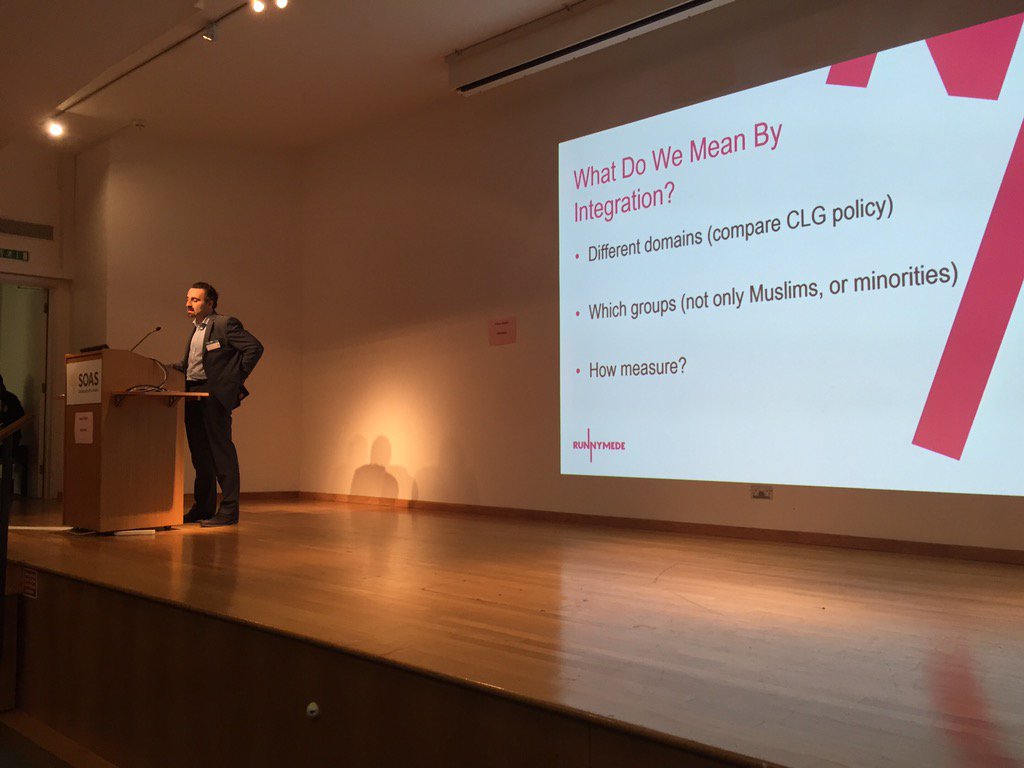
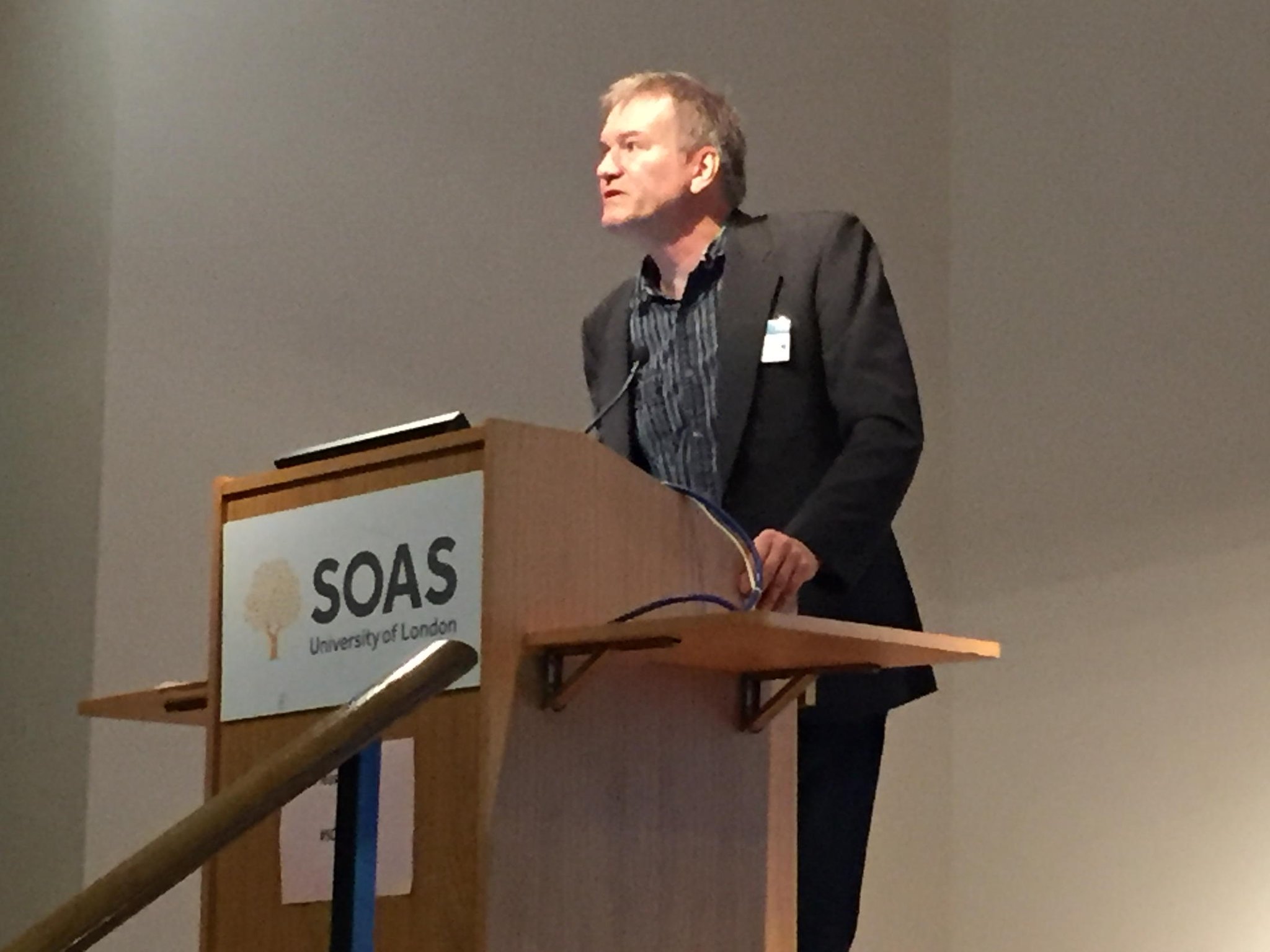
Omar Khan, Integration and British Muslims: The Need for a Wider Agenda
Should think of integration as part of different domains. We need to ask how we measure integration, which isn’t really possible
Communities and Local govt integration: common grounds were shared aspirations and values, responsibility, tacking intolerance and extremism were some of the domains explored. Positive findings across most groups unless talking about migrants –results really did depend on whether or not one was a migrant or not.
Muslim groups, mainly Pakistani and Bengalis are likely to identify as British only. People often quote that Muslims identify more often as ‘British’ only than white counterparts but this is because White British people are much more likely to identify as English
1/3 Bengali men in Britain are chefs and waiters but not necessarily due to choice. Need to ask why this is.
2013 Black Russell Group graduates get fewer jobs than their white counterparts
Migrant optimism may skew the results on satisfaction with democracy because they came to Britain from troubled countries but their children, born British, have higher expectations.
White British folk are the least likely of British ethnic groups to intermarry
Integration is not a uniform, linear process.
Integration is a question for all, not restricted to Muslims
Shouldn’t just focus on British Muslims
Usama Hasan, Hurriyah, musawah, ukhuwwah: Islam and Discourses of Integration
Focuses on liberty, equality and fraternity from an Islamic perspective as well as core Islamic values which do not stop people from integrating.
Women and non-Muslims were treated differently in the Shariah
Early Islam: territorial division according to faith, war and peace
Goes through classical scholars Ibn Asim in Galera where Muslims paid Christians jizya when their town was taken over.
Modern framework replaces the dar al harb/Islam like visas, citizenships
Maqasid al shariah allows people to live within a non-Muslim context
David Goodhart, What Does Integration Look Like in a Liberal Society? Why Does it Matter? And is There a Special Muslim Issue with Integration?
His website: Integration hub.net
Talk about integration in a liberal society. Integration is subjective and hard to measure. Most people feel ambivalent about integration. People feel comfortable in groups where language, cultural references etc, are the same. At the same time, a good society cannot consist of tribes with little mutual regard for others. Integration does not mean having things set by the White British majority.
More individual and liberalism in British society makes it harder for us to rally around.
How much separation is compatible with a modern, liberal state?
Govt hasn’t seen it as part of its role to promote ethnic mixing. Refugee crisis needs to be managed so that national culture is not overrun.
Barriers to integration: language, ignorance of cultural norms and education – these wane over time other barriers include resistance from minority and majority communities.
Muslim integration is a problem based on their south Asian identity and commitment to traditional religious values
Christopher Bagley, The Meaning of Integration in British and Dutch Cultures
Social contract between different groups in a plural society to hold up social, religious and linguistic
Concept of pluralism is an Islamic one – guaranteed the rights of Jews and Christians through jizya
Islamic minority in Britain have been described as new Jews. Demands for integration are actually demands for assimilation – in actual fact is cultural oppression.
In education, Muslim students were more likely to absorb citizenship lessons than their non-Muslim counterparts. Muslim kids bring Islamic values from family and mosque to make them a good citizen route.
Q&A:
To what extent do people see British, Scottish etc. in racialized terms or political terms? Omar: Britishness encompasses history and race. Some work needs to be done on Englishness. Need to recalibrate Englishness.
Panel 2: EXTREMISM & COUNTER EXTREMISM (CHAIR: David Goodhart, DEMOS)
Mohammed Aziz, The legal and non-legal counter-extremism initiatives during the New Labour years of 1997-2010 and their impact on the integration of Muslims in the UK
Rashad Ali, Extremism and Counter-extremism
Rizwaan Sabir, The Quilliam Foundation as a Propaganda Resource in the UKCampaign Against Political Islam
Katherine Brown, Mothering and Caring for the State: Gender Logics in UK Countering Violent Extremism Programme
Waqas Tufail, The Counter Terrorism and Security Act 2015 and the Criminalisation of British Muslim
Extended Question and Answer session
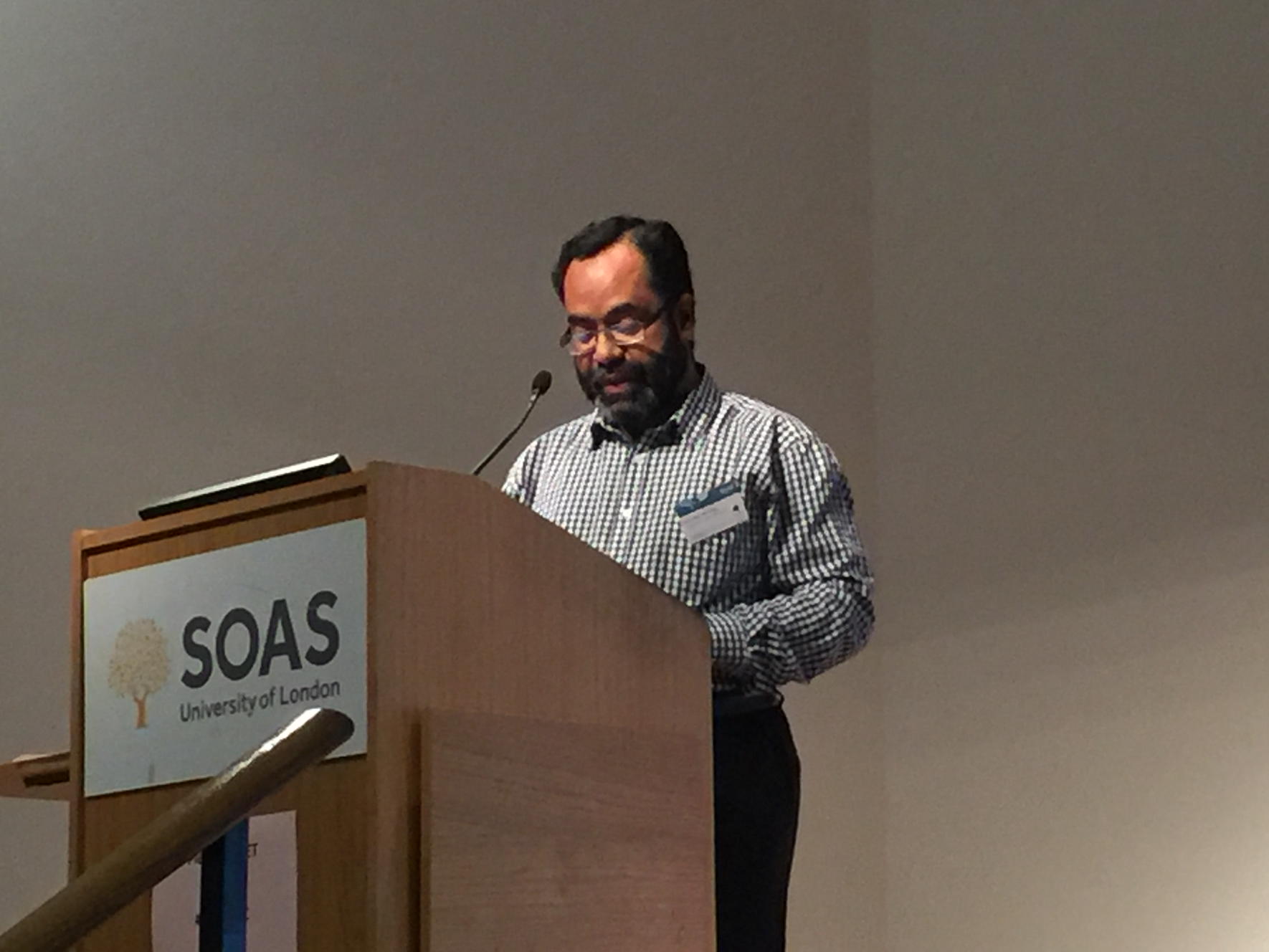
Mohammed Aziz, The legal and non-legal counter-extremism initiatives during the New Labour years of 1997-2010 and their impact on the integration of Muslims in the UK
The Terrorism Act 2000 – introduced by New Labour – main criticism is that it is dangerously broad – very wide definition of terrorism – definition is so wide it can cover almost anything, e.g. direct or industrial action by nurses, doctors, etc. – makes no distinction as to which government the accused is seeking to influence – significantly enhanced powers of the police, to stop and search arrest, which was second biggest criticism – someone can be arrested without a warrant simply because they are suspected of being a terrorist – no definition of what constitutes suspicion – the other stop and search power is found in schedule 7 where constables, custom officers to stop, question and detain people – powers can be exercised on anyone who is merely deemed suspicious – third provision is to do with proscription and terrorist organisations
Second Act – Anti-Terrorism and Security Act 2001 – two key provisions: 1) introduction of provisions of indefinite detention; without charge or trial who are suspected of involvement in terrorism; 2) freezing of asset provisions; money to be seized for up to two years
– Indefinite detention replaced by ‘house arrest’ or control orders
Counter Terrorism Act of 2008 – fingers prints and DNA samples of those subject to control orders
3 sets of impact from 2000-2010
1) Changes to do with Muslim mind set; accepting and recognising that Muslims need to address the issue;
2) Extremist voices were driven underground; and
3) Muslims were dispossessed of fighting the extremists
Rashad Ali, Extremism and Counter-extremism
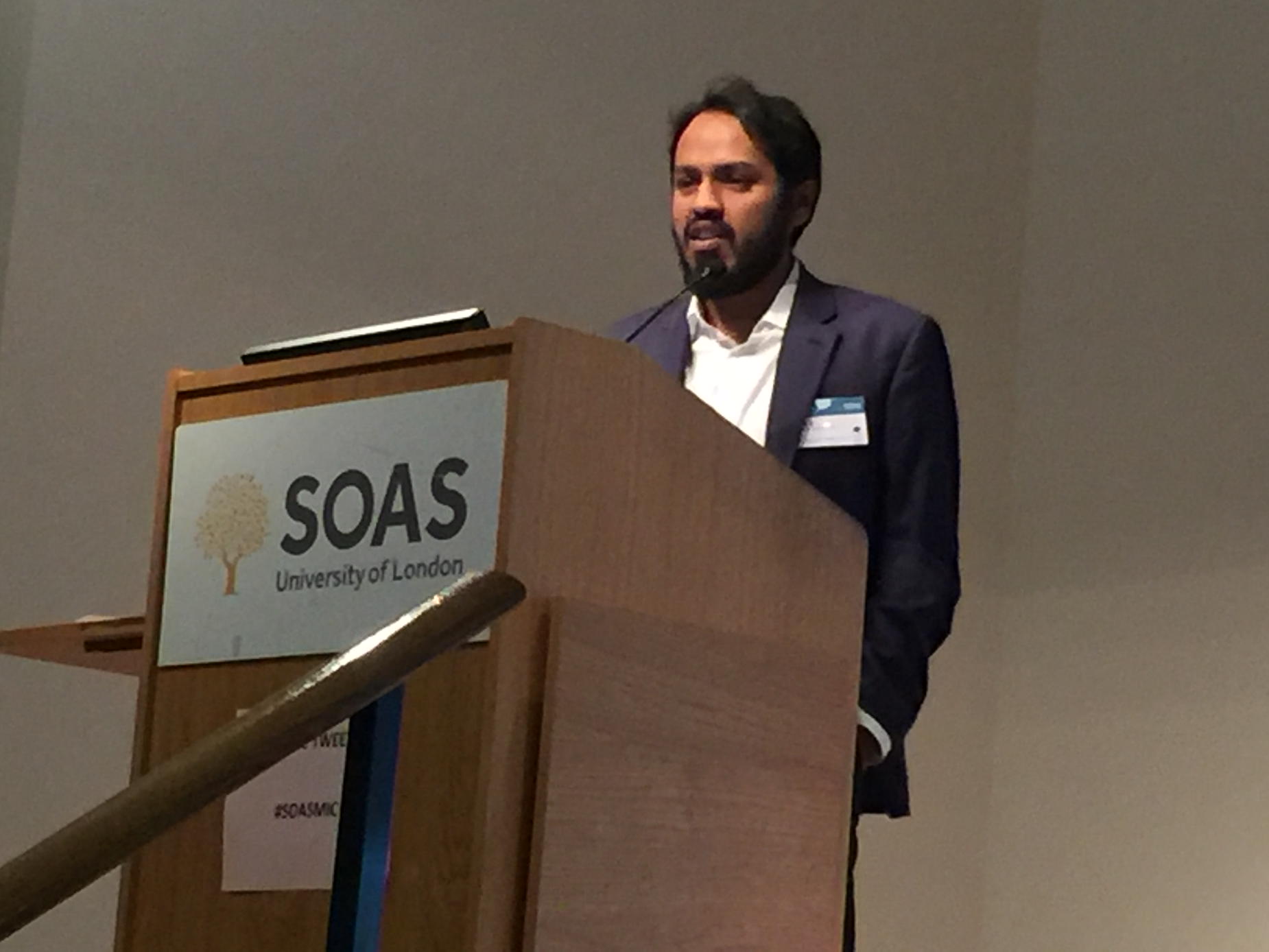
Starts with a recitation of the Qur’an and that one should not go to the excesses of religion – discusses Shatibi and his book on the higher principles of the Shari’ah – what causes extremism is believing that the opinion one holds is the truth and no other opinion can be valid – the problem that arises regarding extremism and counter-extremism is when legislation is brought in in order to manage extremism – a social need to define and discuss these issues surround terrorism, extremism and so on – people become radicalised because they feel they do not belong, so we need to address the issues of belonging and not belonging – in the integration context people describe this discussion as an attack on Islam – when Muslims accept this they are essentialising Islam therefore, possibly showing, that Islam does not accept these values being heralded as British
Rizwaan Sabir, The Quilliam Foundation as a Propaganda Resource in the UK Campaign Against Political Islam
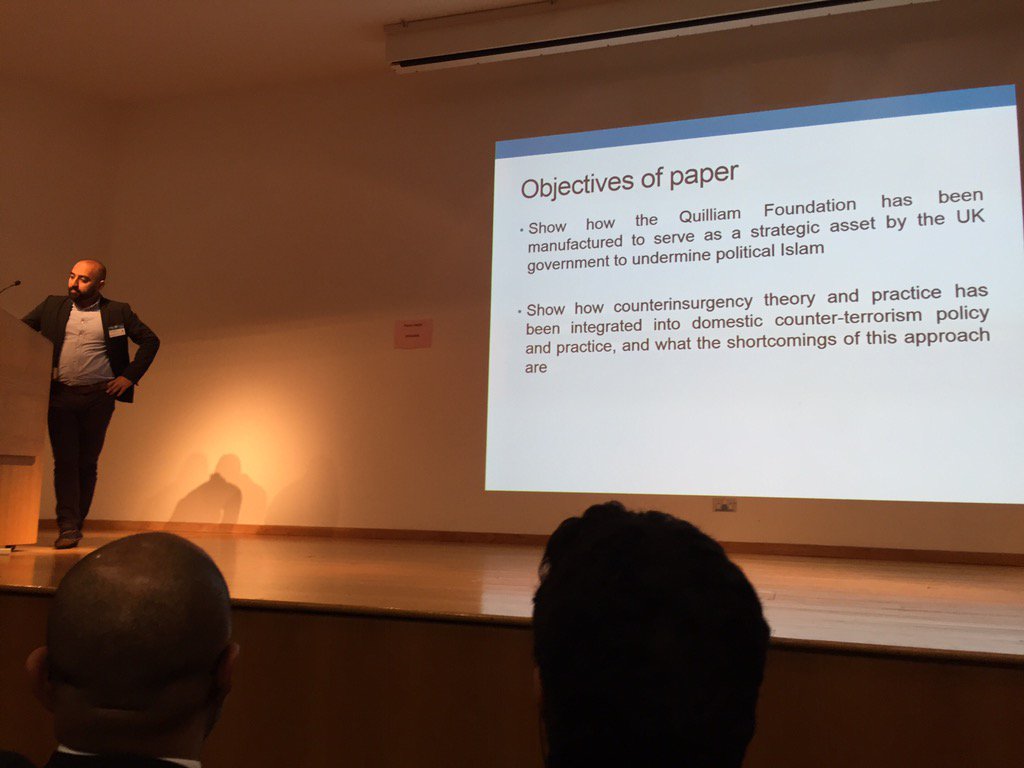
– to show how the QF has been manufactured by the government to serve as a strategic asset by the UK gov to undermine political Islam
– To show how counterinsurgency theory and practice has been integrated into domestic counter-terrorism policy and practice, and what the shortcomings of this approach are
– Organised and strategically driven transnational/global Islamic insurgency that employs tactics according to local conditions within a particular ‘theatre’
– Londonistan considered to be the ‘theatre’ of ‘subversion’, 3 ways:
– 1) intellectual (and propaganda) capital
– 2) fundraising
– 3 ) recruitment
– Countering ideas and counter-propaganda has thus become one of the central components of the global ‘War on Terror’
– Using minimum force and focusing on counter-propaganda is what ‘counterinsurgency’ is fundamentally based on
What is counterinsurgency?
Four ideas: 1) exceptional but limited force and juridical measures allowing ‘pre-emptive’ incapacitation of opponents; 2) greater emphasis on intelligence and surveillance; 3) closer integration between civil, military and judicial power; and 4) ‘influence’ and communication (known through different names such as media-management, propaganda, psychological warfare
– RICU – Research, Information and Communication Unit – conducted research on ‘target audiences’ and messengers, it found: to undermine political Islam, ‘messengers’ who were, inter alia, ‘passionate’, ‘charismatic’ and so on
– Frank Kitson (1971, Low Intensity Operations): ‘although the government may provide the framework and the leadership for psychological operations, it is important to incorporate individuals from an indigenous population’
– Key Leader Engagement (KLE) – to create a group or individuals who will fulfil the agenda and ideas of the gov – this is where QF comes in
– QF – conveyor belt theory – encouraging surveillance under Prevent – preparing ‘lists’ of individuals/groups accused of ‘subversion’
– 2008-2012 Foreign Office (£751,695); Home Office (£1,238,190.10)
– Links to Stuart Family Foundation; John Templeton Foundation; former encourages counterinsurgency
– 39 meetings with government from 2007-2010
– Many other meetings held with CLG
– QF serves as a strategic ‘propaganda resource’ in the UK campaign against political Islam
– The manufacturing of Quilliam shows how COIN practices have been integrated into domestic counter-terrorism policy
– The use of war-time measures for what should be a law-enforcement issues feeds the Manichean claim ‘This is a war against Muslims and Islam’
– Reinforces grievances and potentially perpetuates conflict
–
Katherine Brown, Mothering and Caring for the State: Gender Logics in UK Countering Violent Extremism Programme
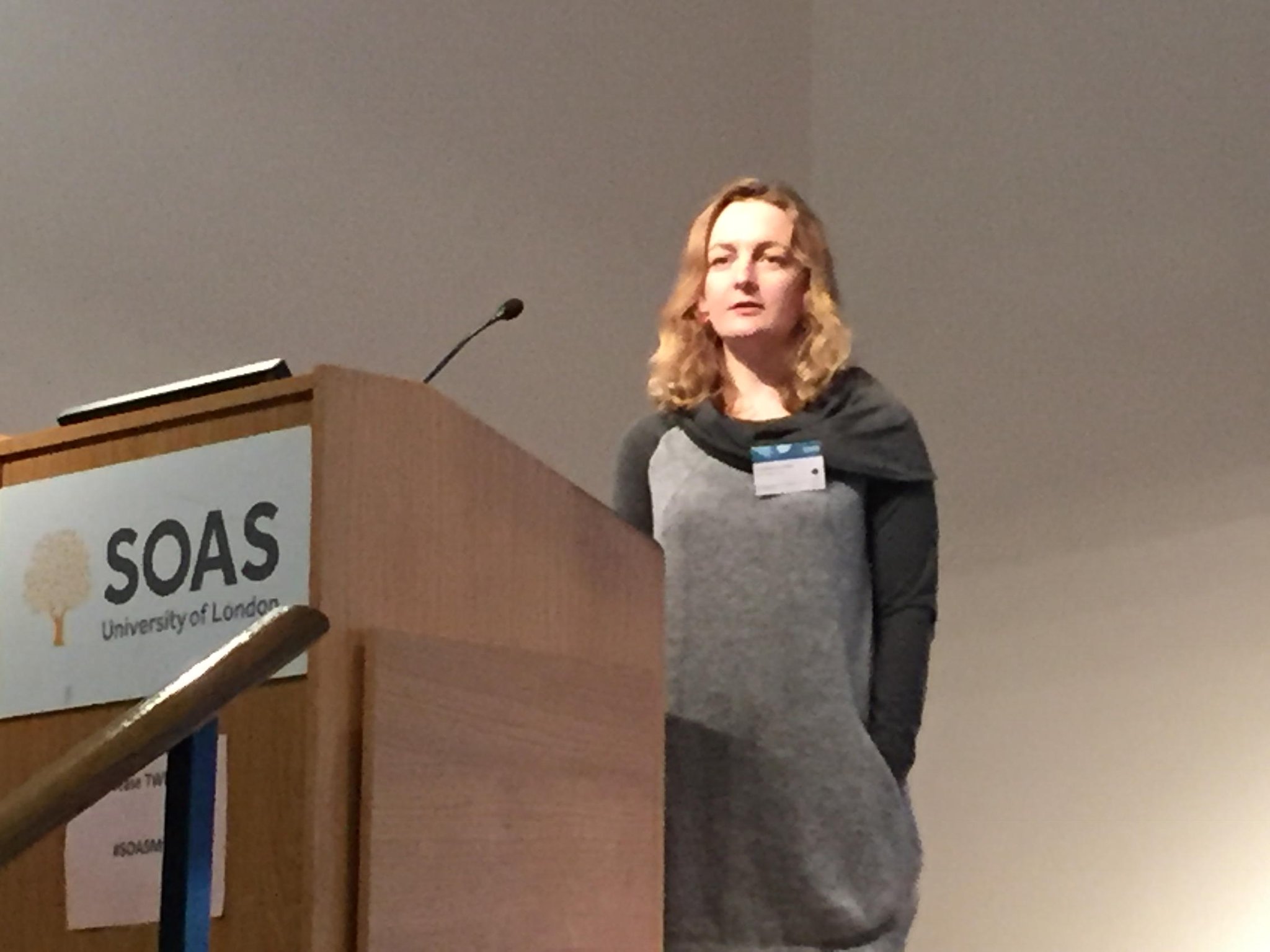
– Why would British Muslim women go and join a war zone? A Q she is asked often by people
– Muslim mothers and wives to note the signs of their husbands’/fathers’ radicalisation and there not given agency or acceptance that they may be susceptible to radicalisation themselves
– They are not going out there (IS) to be a ‘jihadi bride’ but to be a ‘jihadi wife’ – to create a new version of life with their private faith and it to have meaning and purpose
– It is our failure of giving control to the youth and the disempowered voice in the wider society; these are precisely the things they appreciate in IS territories
– According to those within ISIS, British Muslim men have been emasculated, they have a fixed idea of what masculinity is
– What IS have done is they have one answer to problems
Waqas Tufail, The Counter Terrorism and Security Act 2015 and the Criminalisation of British Muslim
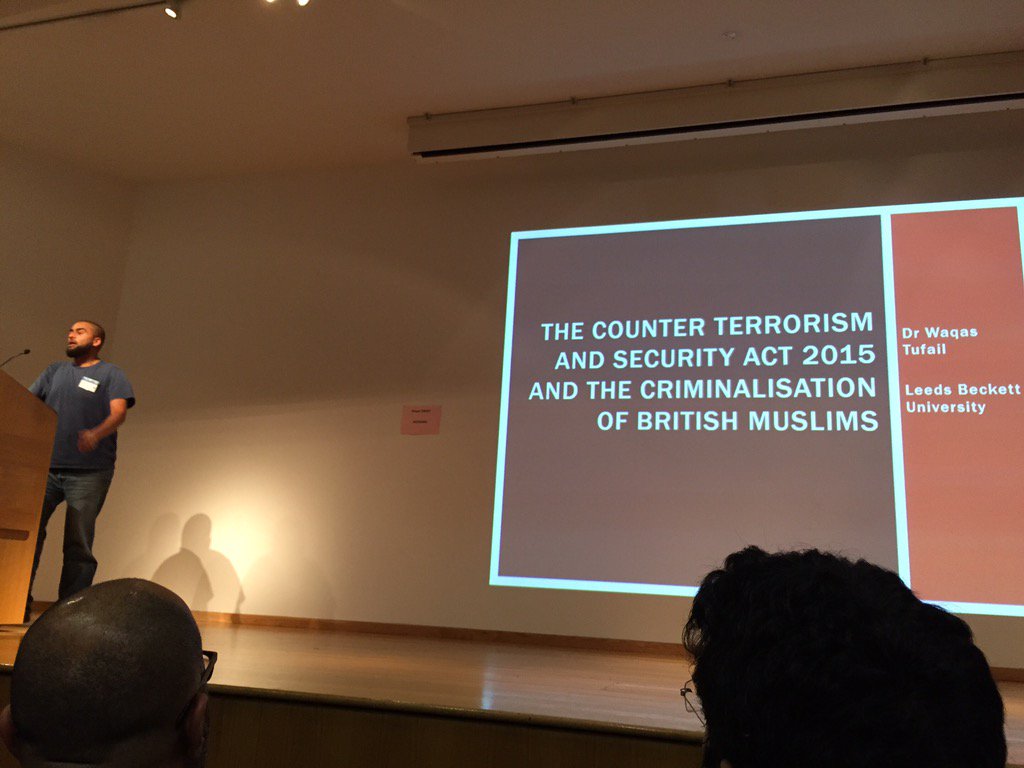
– CTSA widely criticised by Muslims, Human Rights’ Groups, etc.
– Mandatory for public sector bodies to engage with PREVENT
– Has to be situated in the wider context of failures associated with PREVENT (Kundnani, 2009)
– Focus on the ‘partnership policing’ idea underpinning the CTSA
– Non-police organisations to effectively take on policing responsibilities
– Unis, schools, NHS, prisons, LAs fall under this new ACT
– Merges counter-terrorism policing and criminal justice with social policy
– Will lead to the policing of ideas
– Relies on ambiguous concepts such as ‘British Values’
– Local actors to rely on biases, prejudices and misconceptions
– Will be discriminatory towards Muslims – the available research evidence to date on PREVENT (and government rhetoric) points to this
– Channel, like CTSA, is seemingly undemocratic and unaccountable
– Lead further to the alienation and marginalisation of British Muslims
Q&A:
– Chair David Goodhart ‘Surely, the government’s role is to protect is citizens and why should the state not invest in the QF?’ – Q for Rizwaan Sabir
– Katherine Brown: ‘One of the British Values is to be sceptical of the government.’
– Rizwaan Sabir: ‘EuroPol figure is not an abstract figure.’ ‘Government trying to legitimise its policy by using civil society thus becoming an extension of the state.’
– Mohammed Amin asks the Q to Katherine Brown: ‘Are you finding any equivalence between IS and the UK in their poor governance?’
– Abdul Aziz clarifying some points about the legislations and how we need to work with different groups, not just those who sound and speak like the government
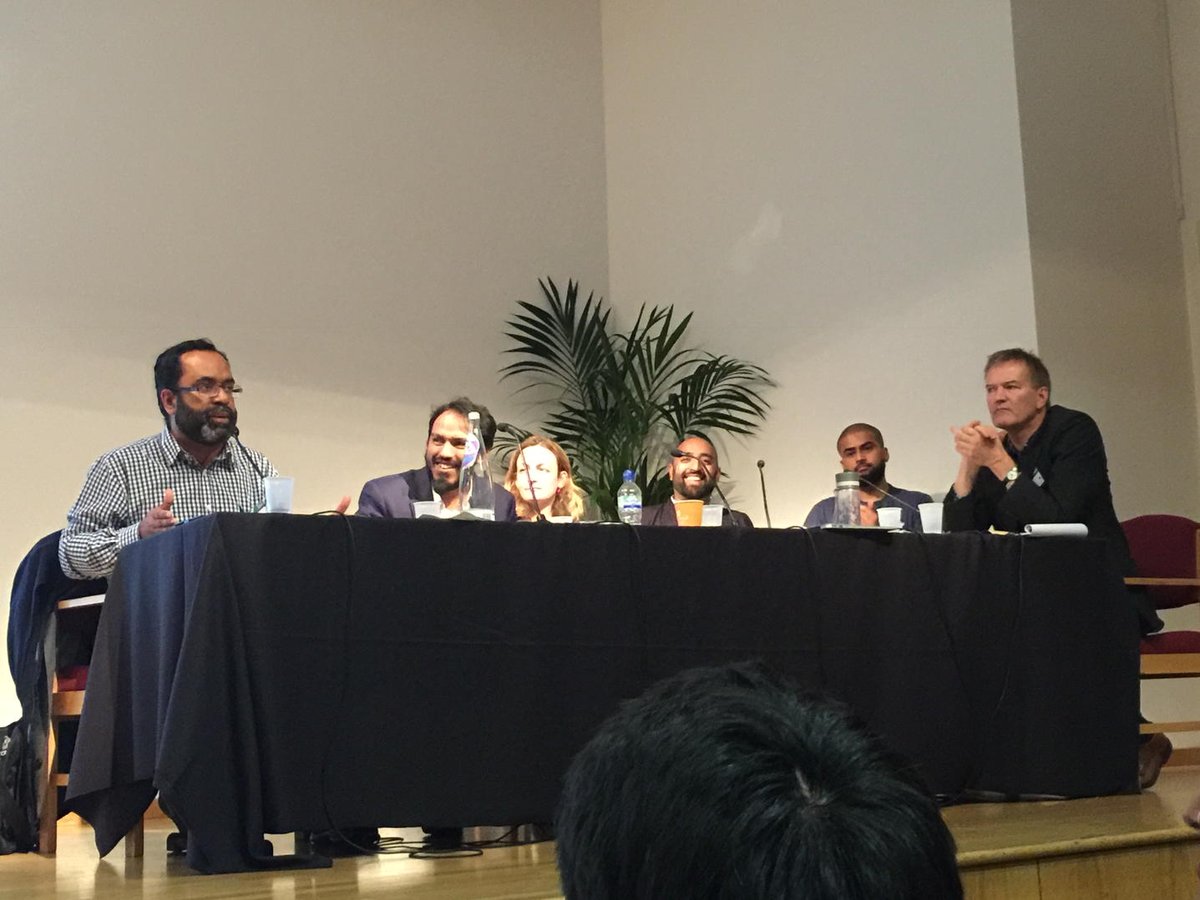
Panel 3: EDUCATION AND GEOGRAPHIES OF DIVISION
(CHAIR: Alison Scott-Baumann, SOAS)
Anthony Heath, ’The Relationship Between Religion And Poverty
Waqas Tufail, Rotherham, Rochdale and the Racialized Threat of the ‘Muslim Grooming Gang’
Alyaa Ebbiary, Making Modern Mullahs in Britain
Hywel Jones, Integration and the Prevent Strategy: A Knowledge Based Approach
Extended Question and Answer session
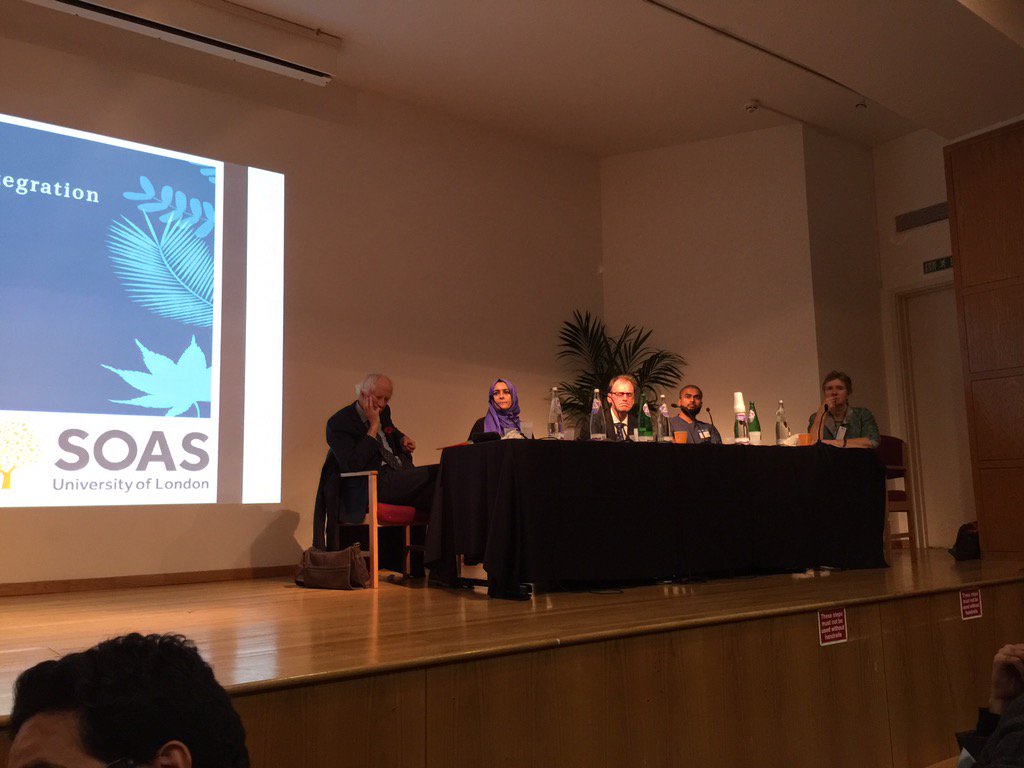
Anthony Heath
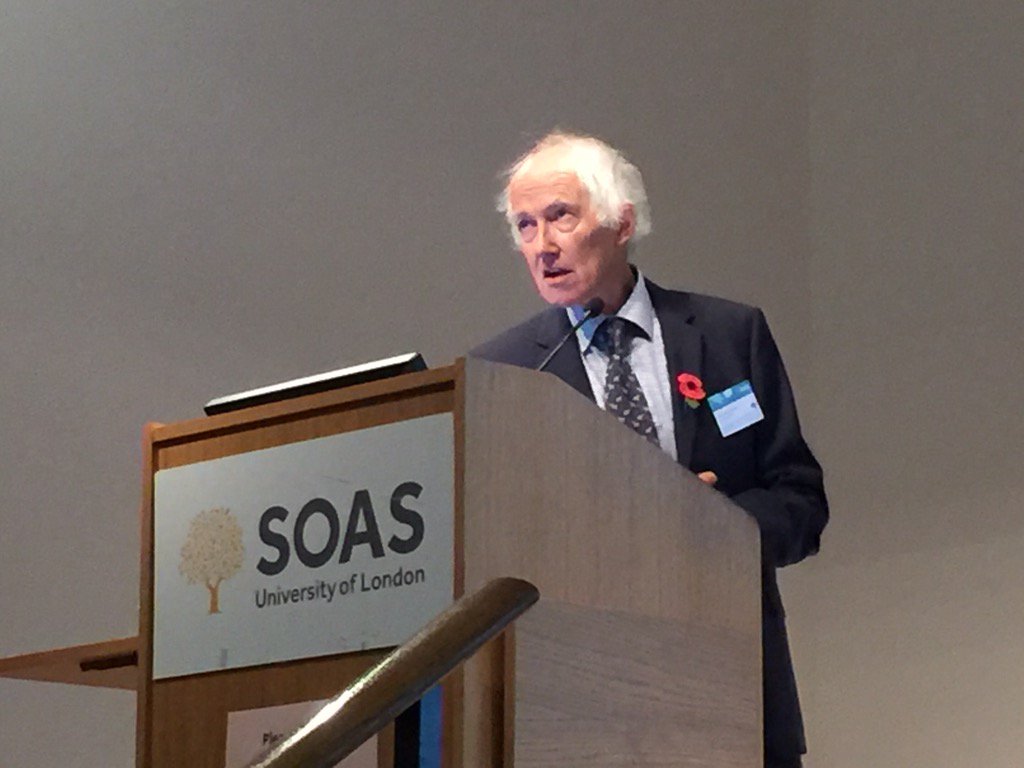
– UKLHS: Muslims face most poverty at 50% – next Sikhs at 27%. Jews do best at 12%.
– Why do Muslims do so badly?
– Is it a Muslim or ethnic poverty (eg, Bang/Paks – who are 95% Muslim
– Is it Ethnicity or Religion? – Nb: White Muslims at 30%, but White non-Muslims at 16% – therefore, certainly a religion element there
– Possible explanations:
– transitory factors – migration (lack of English; LDC origins – 2nd gen disadvantaged in labour market – legacy issues)
– intrinsic to religion – family values (eg, care responsibilities of women), religiosity (bonding social capital), mismatch with jobs
– attitudes from majority community – prejudice/discrimination – discrimination by employers, chill factor (cold reception/unwelcome feeling), pre-labour market discrimination (eg, in access to elite HE institutions)
– practical difficulties
– regression analysis – Total (0.2) – Transitory (0.16) – Intrinsic (0.092) – Social capital (0.085) – Labour Market …
– other factors: Islamophobia and the chill factor
– Reasons for optimism:
– convergence over time
– generational change
– new levels of educational achievement
– Policy responses:
– discrimination at universities
– poor economic environment where concentrations of Muslims – eg, the North
– barriers to women
– Islamophobia in the media
Waqas Tufail
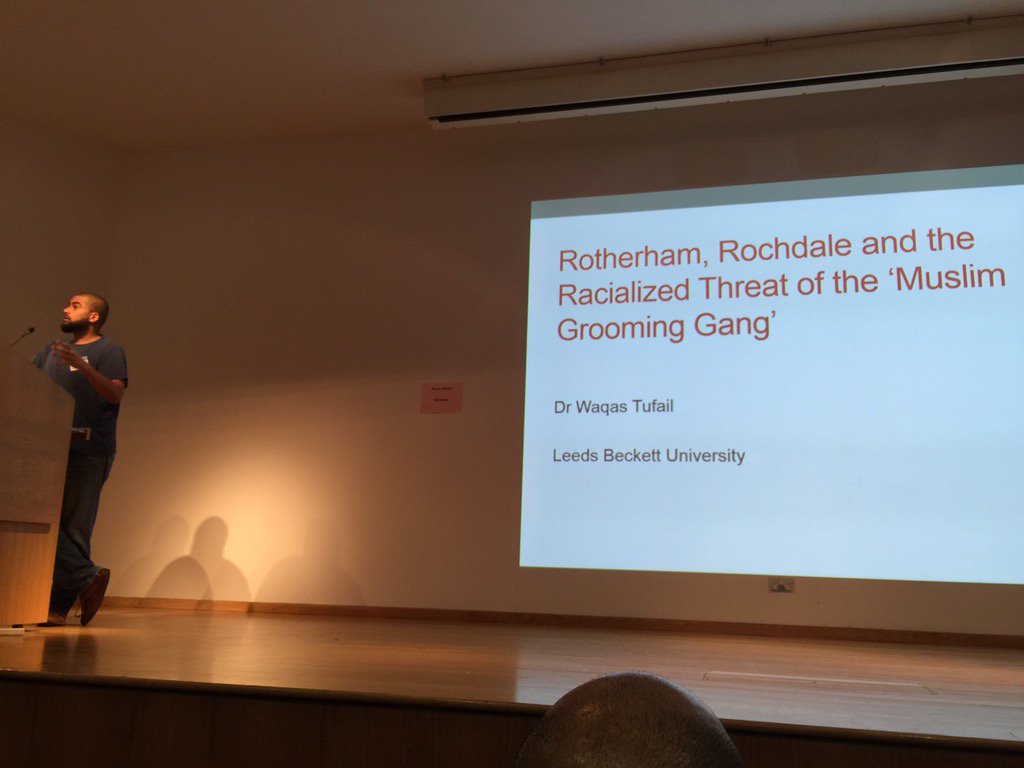
– interviews in Manchester, mostly Rochdale – during the grooming scandal
– Rochdale grooming case
– May 2012 – 9 sentenced to prison for offences including rape
– widespread media attention
– attacks on takeaway – no headline – EDL deny responsibility but approve action
– surge in anti-Muslim racism/violence
– June 2012 – EDL protest in Rochdale town centre
– ‘ethnicity as a factor’ in this type of abuse
– Explicitly advocated by Simon Danczuk – Labour MP
– Jack Starw – ‘ethnicity here can’t be ignored’
– Sayeeda Warsi – ‘race is a factor in grooming’
– David Starkey – ‘acting within cultural norms’
But – not explained through race, ethnicity, culture or religion when Jimmy Saville story broke or when 10 men were jailed in Oct 2013 for an attack on a 13 year old girl by 30 attackers – where the perpetrators were White.
– Impact on Muslims
– March 2013 – Rochdale Council sets teenagers to spy on taxi drivers for ‘intelligence gathering’
– Oct 2014 – taxi firm owner admits white drivers only requests
– Amplifications
– when a White priest does it is not grooming
– intense hatred against Muslims
– criminalisation by association
– Danczuk: ‘Asian men have propondancy to be involved in this type of abuse’.
– Othering through racialisation
– Islam/Muslims collectively responsible
– Muslim voices – apology/condemnation – demanded
– Politicians/media ‘other’ Muslims
Alyaa Ebbiary
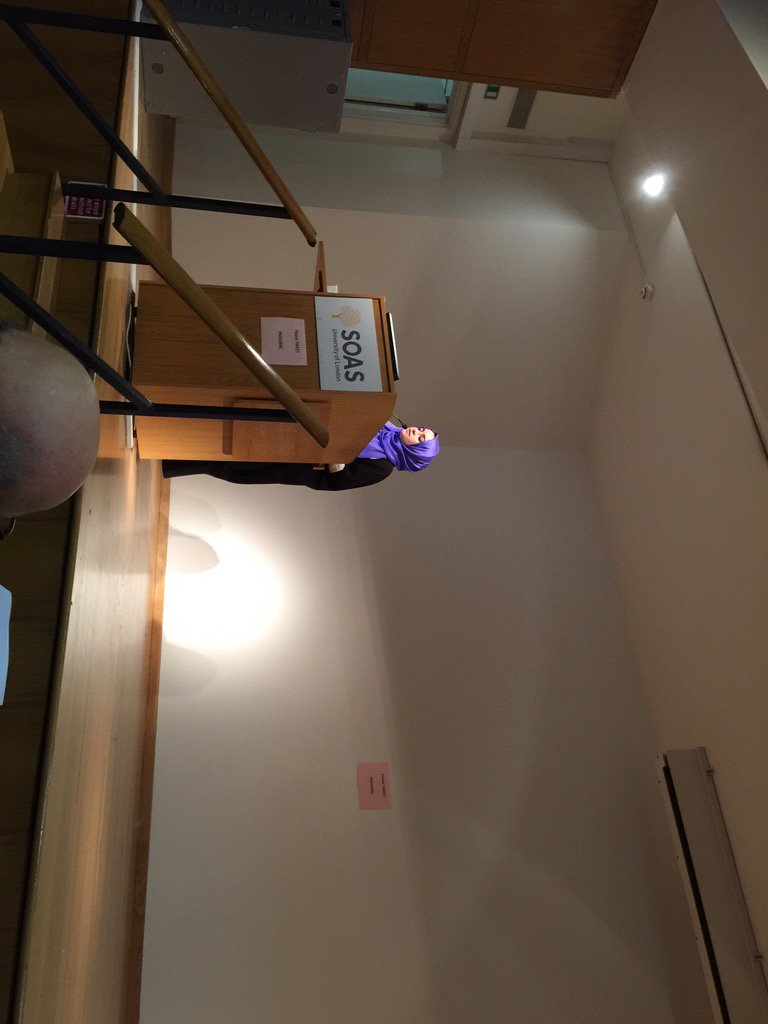
Graduation day at CMC – all Muslim men and women. Darul Ulums teach learning and adab of learning, CMC seeks to augment that DU learning and provide specialist training and practical skills.
– Classical Islamic sciences training – nowadays around small fiqh issues, but in old times much broader – narrative of decline – the waqf system dissolved during the Empire era – now Muslim nation states have nationalised religious education – disaster for credibility of Islamic learning – the ulama’s authority is undermined. The ulama in India have adapted.
– The UK context – over the last 50 years, there has been enormous social change. Muslims now biggest single minority group. Rise of integration issues and policies in a whole host of areas – including education, health, etc.
– For media – integrated communities are those that are assimilated and not visible; integration is a one way process – Muslim exceptionalism. Integration is an ideal.
– British vs French approaches – Br approaches is ‘take me to your leader’ approach; Fr approach is very assimilationist.
– Field work – Imams gathering – from different ethnic backgrounds but mostly trained abroad, under-resourced and over-burdened, and facing a lot of committee pressure.
– CMC offer a 1 year contextualisation programme for the best students from the DUs. The DU curriculum is very intensive but outdated – therefore, the authority of its graduates is questioned. CMC is modelled on the Cambridge colleges system but not affiliated to Cambridge Uni. Students mostly from south Asian background. One student said ‘if not at CMC, would not have met a non-Muslim White except at the doctors’!
– Problematising the integration discourse – would like to take ownership of the integration discourse, not be dictated to.
Hywel Jones
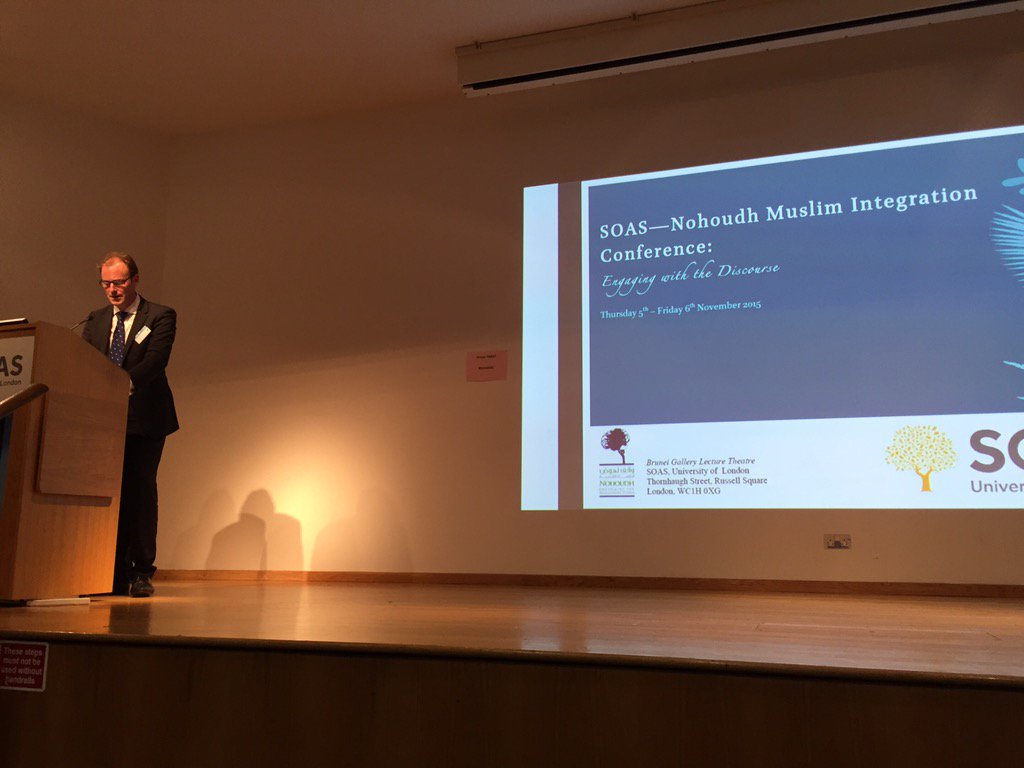
– Curriculum designed before the 2015 Act – not as a response to it
– July – Security Act comes to schools – prevent radicalisation of young people. Not about preventing travelling to Daesh, but how to integrate into mainstream.
– Schools have responded differently. School leaders elsewhere have raised concerns about Prevent training – 3 main concerns:
– generalisations – generating stereotypes
– broad context of all types of extremisms
– not to generalise about political violence
– Need a rich and intellectually developed base within schools – just alerting to risk is not enough, need historical narrative. Need wide knowledge to rebut extremism – need clear, substantive, historical and political reference points – eg, rise of political anarchism in the 1900s – bombings, etc; CIA funding the mujahideen, etc.
– Ideas put out by AQ/Daesh are problematic – young people access international news – but so are ideas put out by the far right. Young people are intellectually and historically inquisitive. Need to provide broad, meaningful context and framework to AQ/Daesh – as totalitarian approach like Nazism and Bolshevism.
– There are violent and liberal temperaments in all societies, but liberal values in all societies under attack.
– How can schools address the problem:
– Staff must have in-depth and knowledge-based approach and appropriate skills set
– Demands on RE, CE, etc syllabi
– Prevent training – but in wider context/framework of history of extremism
– Bring in specialist speakers
– Develop specific resources
Q and A
– When comparing, not to be used as an excuse – 2 wrongs don’t make it a right – eg, bullying
Hywel: Clear liberal and moral values should be applied to all.
– Female imams?
Alyaa: Men and women can be scholars/teachers (alim/alimah); but only men can become imams
– Liberal values under attack – but so are Muslims. Muslims should be protected as part of liberal values. Only protecting liberal values at cost of Muslims is double standards.
Hywel: work with young people needs to be set in broader context – rise of extremism/ totalitarianism – rise of AQ/Daesh is same as Nazism/Bolshevism
– Prevent vs reactions from Muslims – can we change the terms of the discourse – how about the right of Muslims to be able to assert their identity, views, politics, etc.
Alyaa: Muslims are finding many ways to take ownership of the integration agenda, but are careful not to be seen as too close to Government – Muslims need space and agency to continue this work.
Waqas: conflating CT and policing issues – danger of pathologising British Muslims in schools – cf, pathologisation of BME communities in knife crimes. Prevent officers have little knowledge and are not very autonomous.
Hywel: Education in UK is autonomous. Prevent officers are a mixed bag. Prevent should not be about targeting Muslims. Muslims should learn about their own tradition but also integrate.
– Has Government taken account of socio-economic factors in its policy work?
Heath: Coalition did not, but PMs recent speech on equality is encouraging. Prevent in education is not good for preventing extremism. Education should result in opportunities, and makes students feel this.
Hywel: A balanced curriculum is the way forward – currently only 25% of schools do the EBAC.
Heath: This should be the core business of schools – not prevent or promoting liberal values, but good education and skills that lead to universities and jobs – to create a level playing field.
Alison S-B: Teaching prevent to the young is tempting prophecy!
Panel 4: NORMATIVITY & DIVERSITY: RACE, ETHNICITY & BELONGING
(CHAIR: Amina Yaqin, SOAS)
Ron Geaves, The Contemporary Relevance of a Nineteenth Century Muslim Community in Liverpool
Fatima Rajina, Dress and Language: A Critical Analysis of the Concept and the Process of Identity Construction within the British Bangladeshi Muslim Community in East London
Chris Allen, Tackling Extremism, Reinforcing Islamophobia? A critical analysis of New Labour and Coalition policies and discourse
Khadijah ElShayyal, How have the ‘soft-power’ type initiatives employed by the UK government’s securitisation agenda affected the identity of British Muslim young people and women?
Ashraf Hoque, Citizenship, belonging and political activism.
Extended Question and Answer session
Ron Geaves – The Contemporary Relevance of a Nineteenth Century Muslim Community in Liverpool
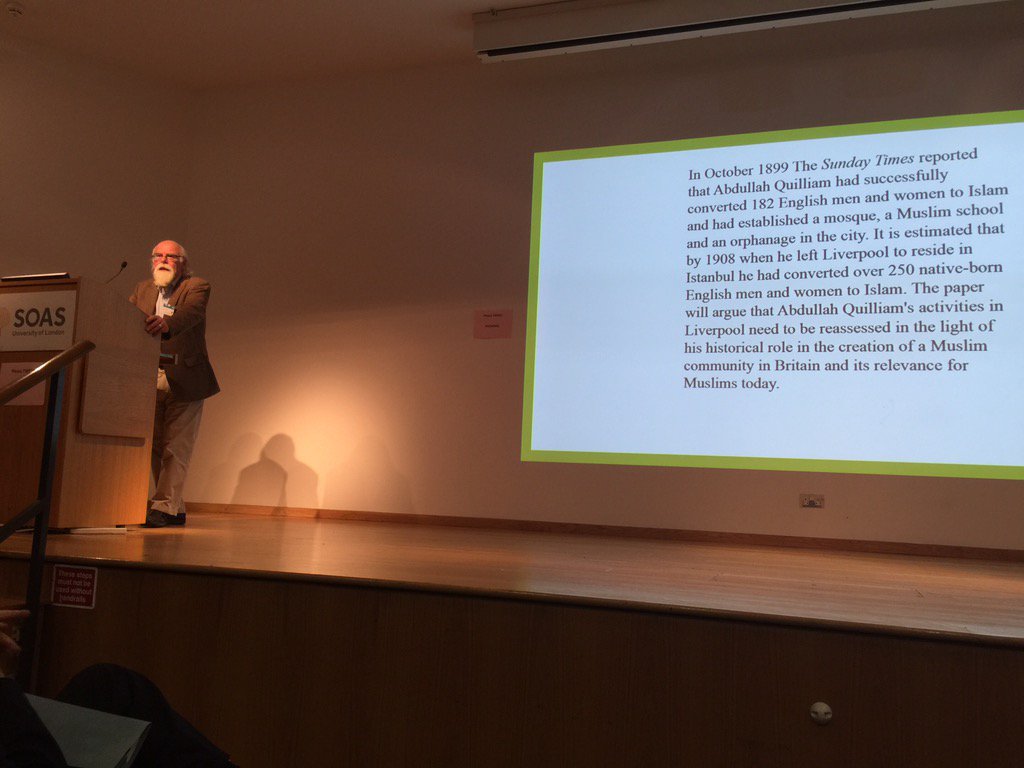
Speaker opens by highlighting that he lives and works in Wales – a part of the UK with precious little mentioned in the conference proceedings so far, despite its interesting multi-ethnic history.
- His publication about the life of Abdullah Quilliam generated a lot of attention from Muslims worldwide as Quilliam is iconic.
- Quilliam was a visionary and a pioneer English Muslim
- Explores the life and times of William Henry Abdullah Quilliam. The establishment of a mosque in Liverpool and a focal point for the diverse elements of Muslims. Examines Quilliam’s achievements and his legacy.
- Quilliam especially espoused that Muslims extend their commitment to social justice to include non-Muslims
- His attitude to foreign policy toward Muslims in the colonies was controversial. His community became the victims of Islamophobic vandalism which the speaker argues occurred during periods of war with the Muslim world.
Fatima Rajina – Dress and Language: A Critical Analysis of the Concept and the Process of Identity Construction within the British Bangladeshi Muslim Community in East London
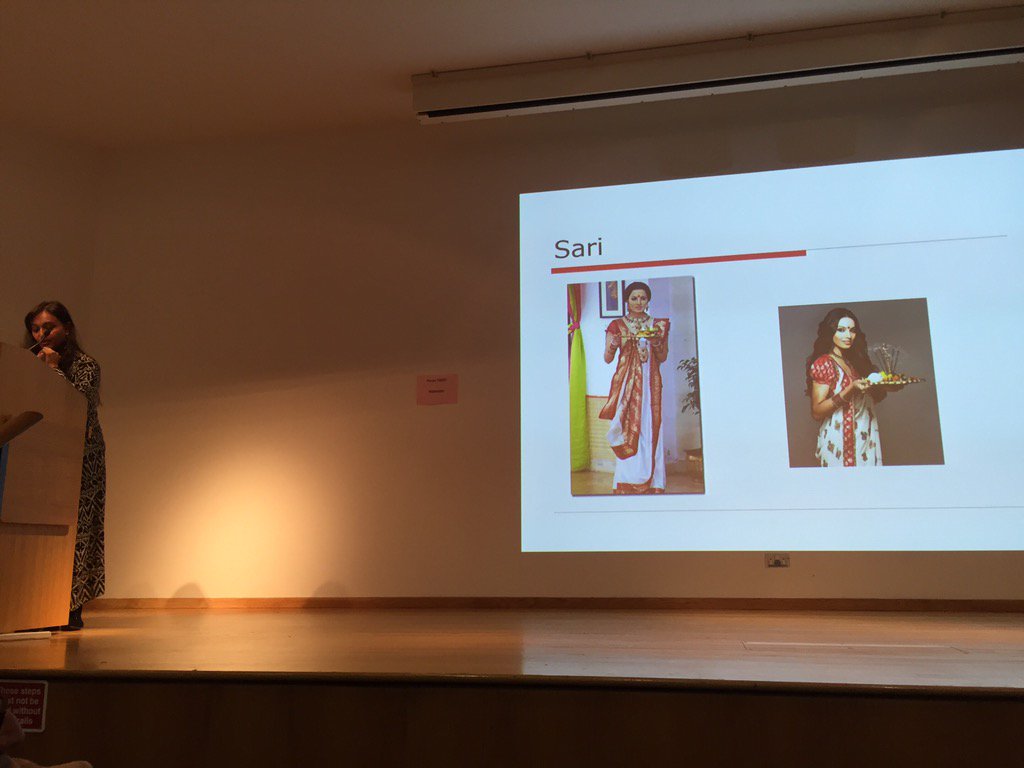
Explores the history of Muslim settlement and rule in the Bengal
- British relationship with Bengal, stereotypes and political baggage from the East Pakistan period
- The Bengali language movement
- Killing of Altab Ali in 1978 was a turning point – mass solidarity against racism in East London
- Pointing out clothing observations from research
- Sari
– negative attitudes esp. from men
– considered immodest by both Islamic actors as well as British Imperial actors
- Salwar kameez
– considered more Islamic
– Lunghi & Funjabi
- Language use changes with intergenerational growth
Chris Allen – Tackling Extremism, Reinforcing Islamophobia? A critical analysis of New Labour and Coalition policies and discourse
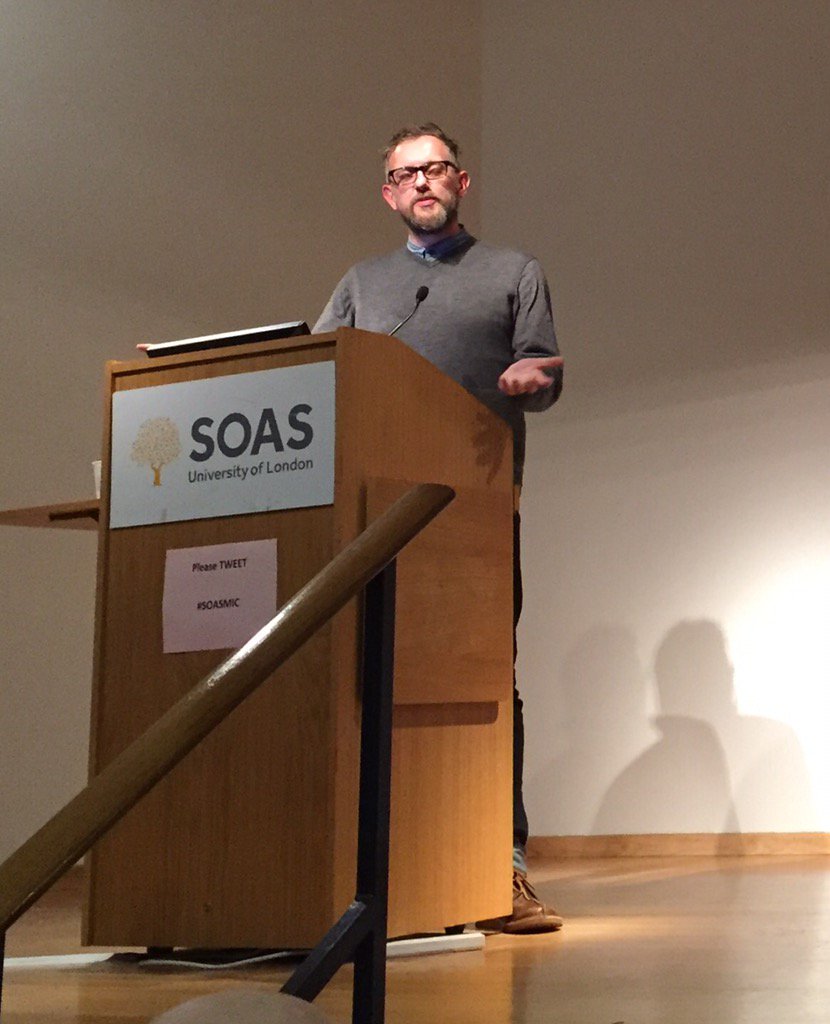
- Very few policies have been introduced over the last 15 years specifically dealing with Islamophobia
- Examines a series of government announcements and actions around extremisms and Islamophobia
- Every time there is a need for legislation on Islamophobia, it is framed within the counter-extremism agenda. A link is created by government between extremism and Islamophobia suggesting that one causes the other – cf. Stuart Hall in the 1970s “anti-black racism will reduce if black men stop mugging”.
- A lot of the public discourse on the need for counter terrorism legislation aggravates Islamophobia – the idea that there can be no smoke without fire.
- Explores the white noise background in which normative truths about Muslims exist – those givens about Muslims opposing ‘our way of life’.
- Islamophobia legislation acting as a pacifier for the Muslim communities. “We’ll deal with this as long as you don’t rock the boat on anti-extremism stuff”
Khadijah El-Shayyal – How have the ‘soft-power’ type initiatives employed by the UK government’s securitisation agenda affected the identity of British Muslim young people and women?
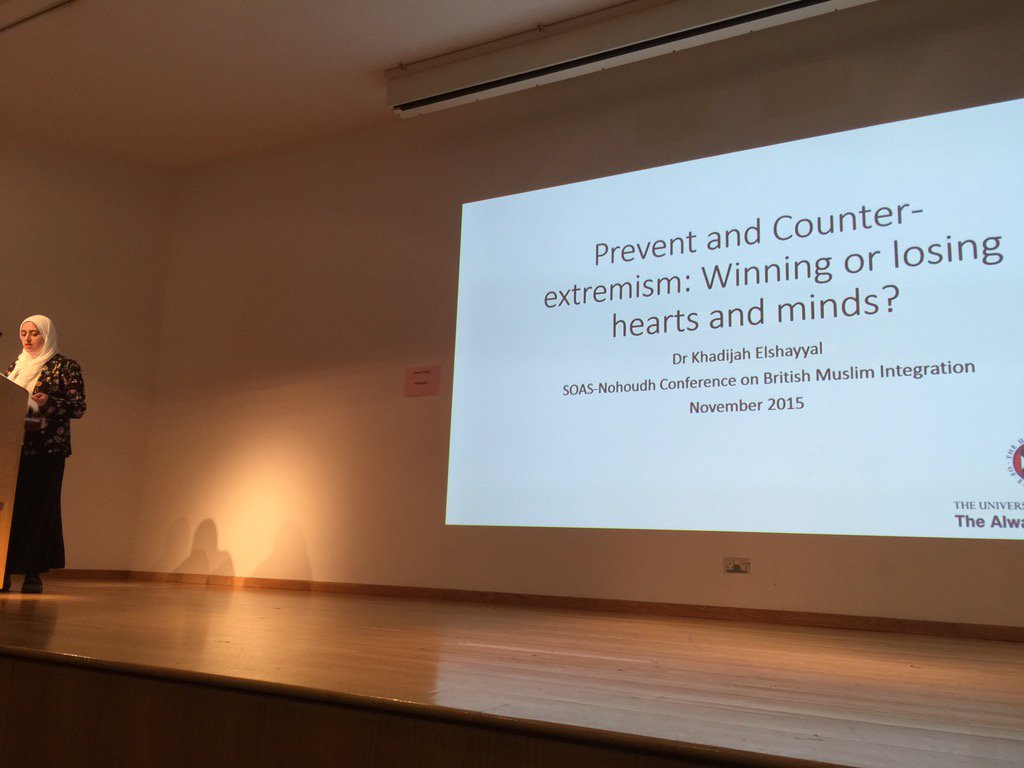
- Soft power and Prevent
- Not so much interest in the rights and wrongs of prevent but the inter-community dynamics that resulted from the policies
- Changes in Prevent
– theology
– community cohesion through security lens
– non-violent extremism
- Examination of NMWAG and YMAG – marketed as an avenue to engage with government but ultimately felt to be suffocating by some participants.
- Post-2011 Coalition Government shifted focus from community cohesion to tackling non-violent extremism
- Examines 3 projects aimed at bringing female voices into Prevent strategy
Also:
- Work with young people
- Humza Arshad
- Adam Saleh
- Imams Online – Haqiqa magazine
Ashraf Hoque
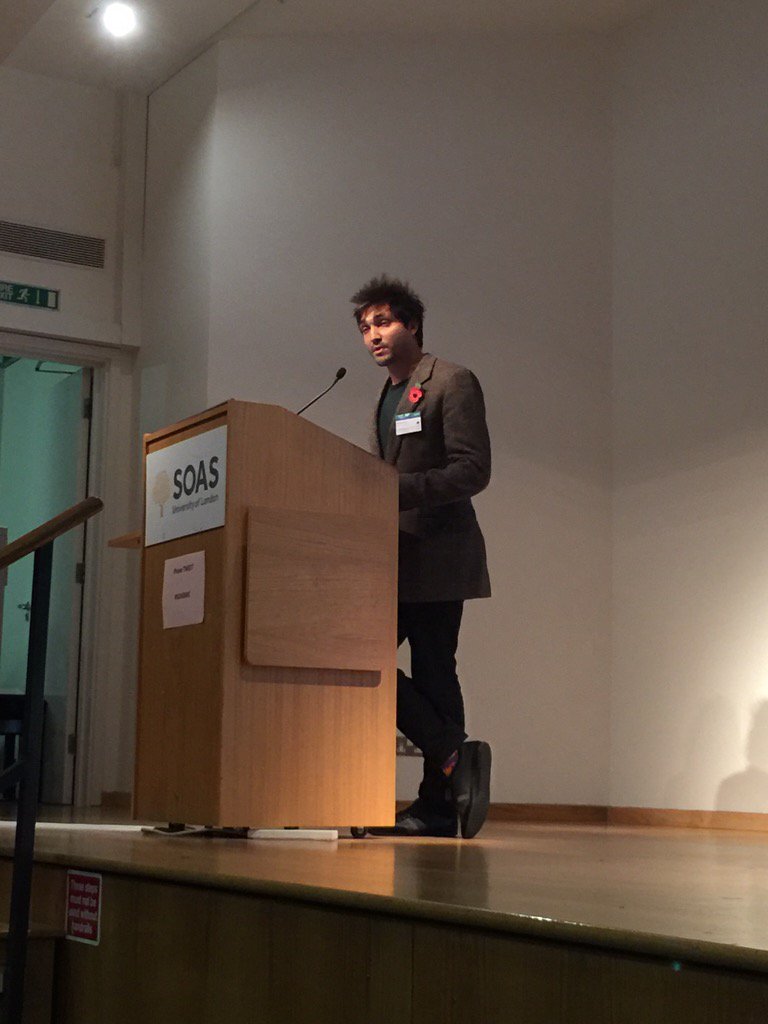
- Compares Luton and Tower Hamlets field sites from his research.
- Reasons the 2 areas could be perceived as having failed to integrate
- Ideas around Muslim exceptionalism and preferential treatment
- Explores narratives of migration to help understand current social situations.
- Subjective intergenerational account of everyday life of Muslims
- Through the life narratives of 2 men speaker explores the issues of citizenship, belonging and political activism.
– One young Pakistani-origin man in Luton who is more vulnerable to criminality than to extremism
– The other is a Bengali councilor who pioneered political representation of Bengalis in Tower Hamlets
Question & Answer session:
1) Gendered voices?
2) How to deal with the government moves?
Quilliam advised government that Islamophobia has been hijacked by Islamists – ridiculous!
3) Julie Siddiqui on women’s participation – nothing changes?
Bottom up approach instead of top down
Boycott all male panels
Fatima – men don’t get asked about clothes
Amina Yaqin asks Ron about the importance of exploring Islam in Britain before 9/11
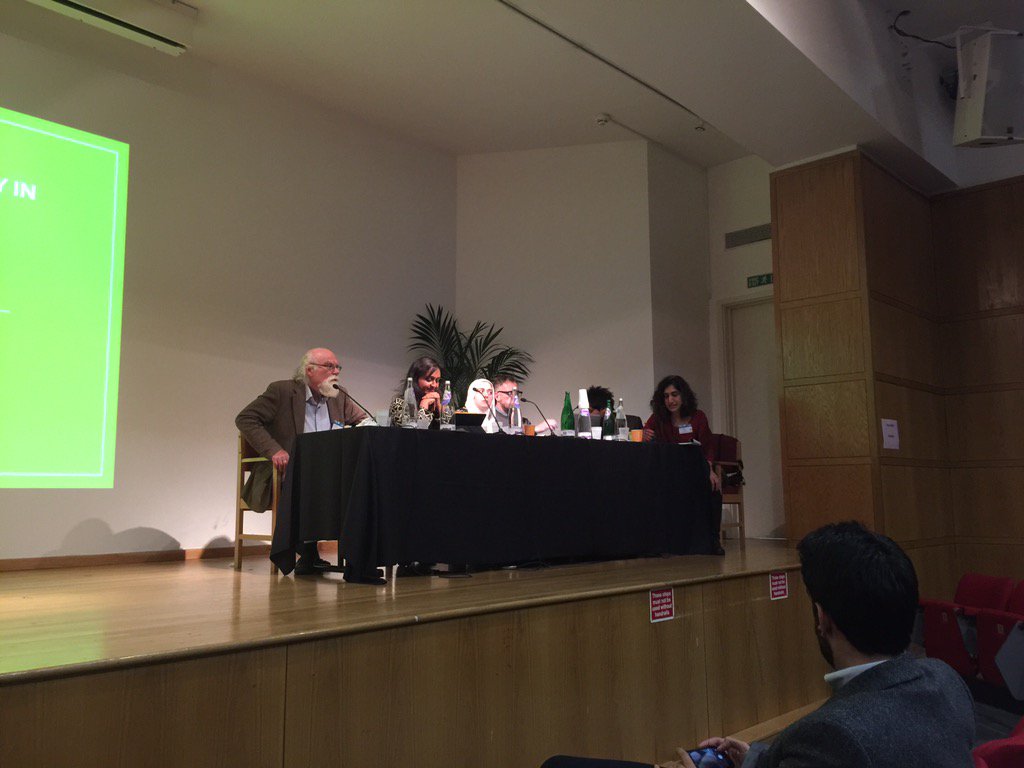
Thursday evening dinner – Keynote by Baroness Sayeeda Warsi
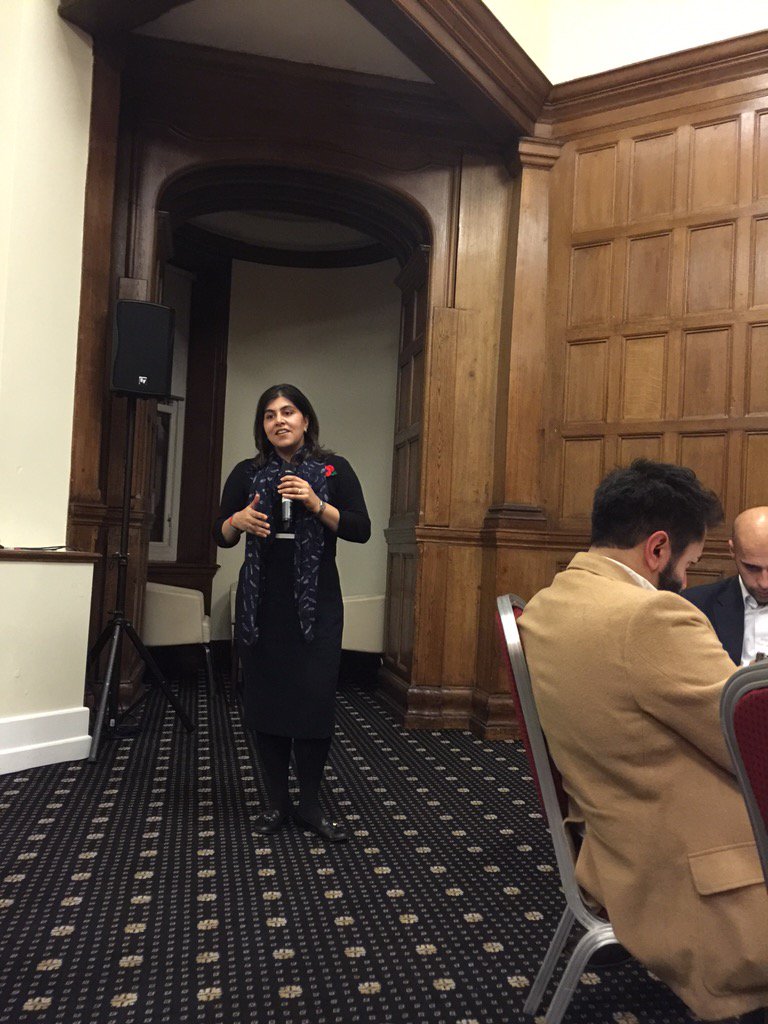
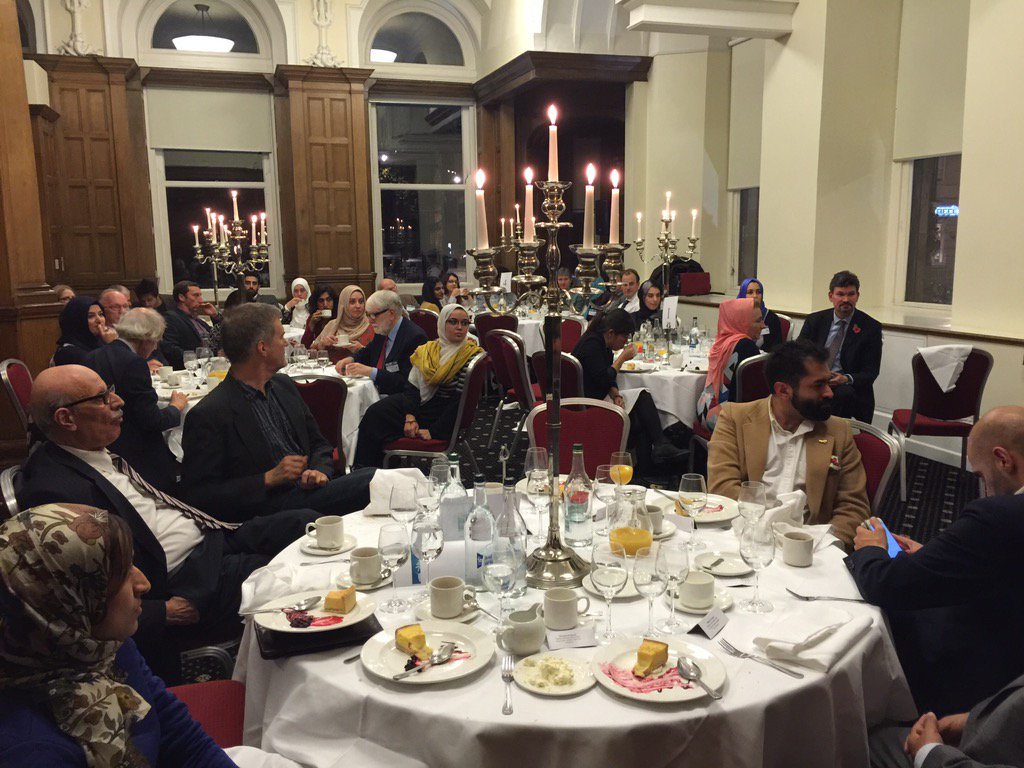
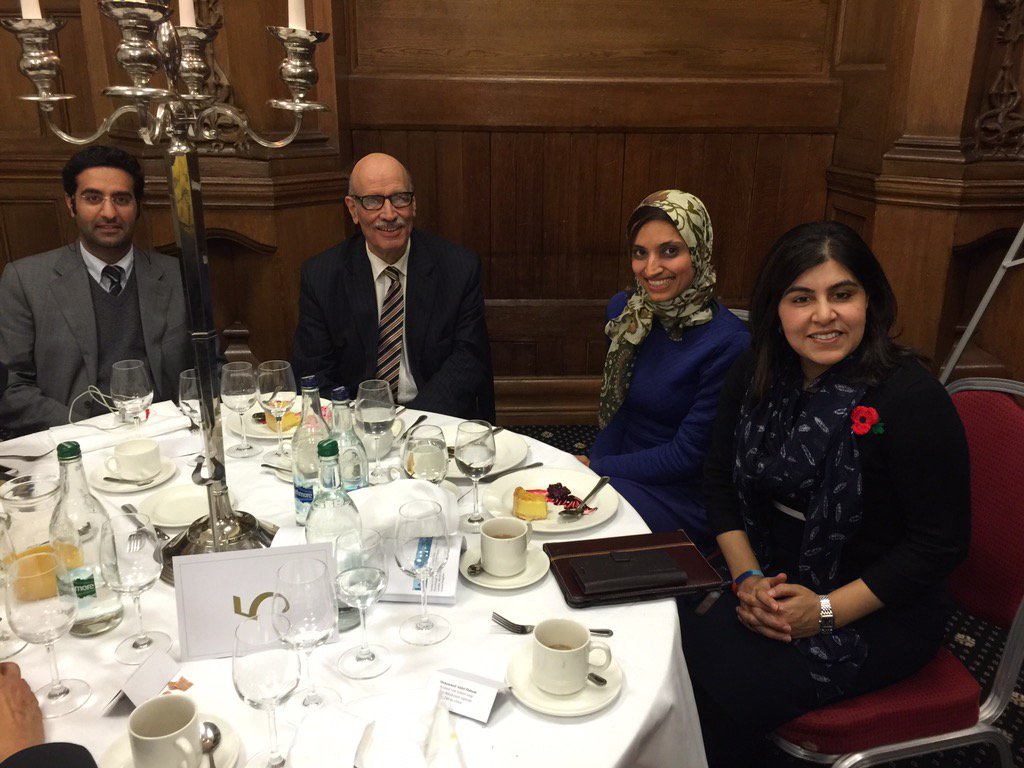
Friday, November 06, 2015
WELCOME BACK (Alison Scott-Baumann, SOAS, University of London)
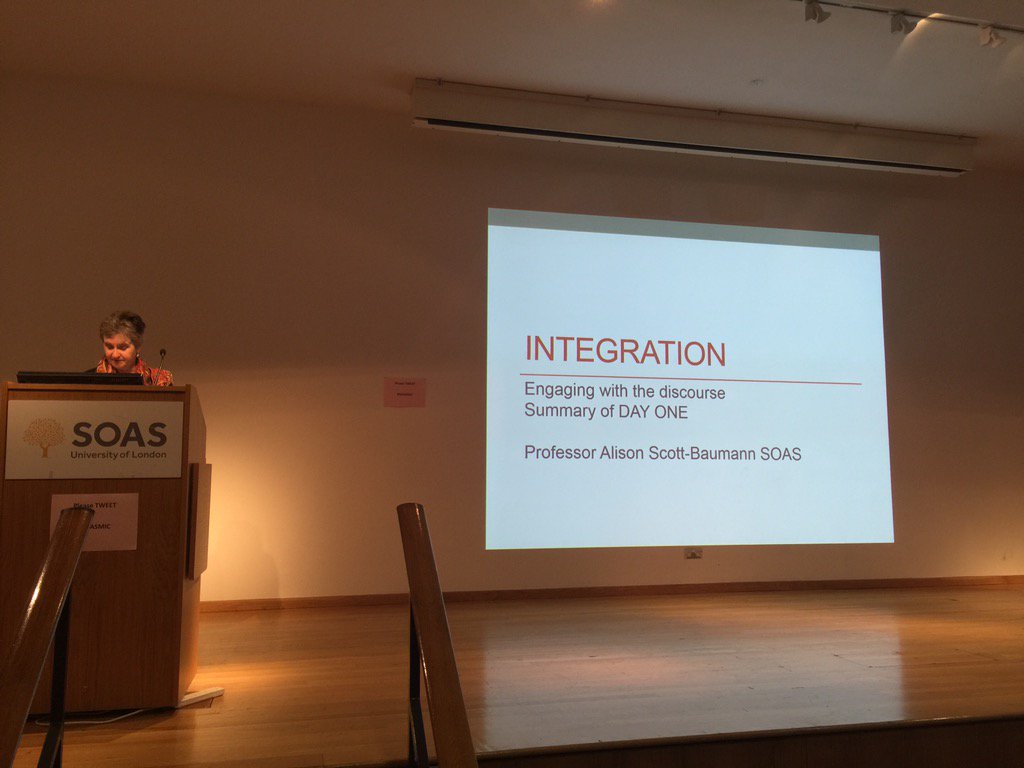
What is integration? Trevor Phillips advocates manipulating people to change their behaviour
David Goodhart, ‘people who don’t want to become part of us’ – decaffeinated Muslims. In integration the majority makes the rules, in our secular society in Britain today, religion has become an index.
Range of approaches
‘us’ vs ‘them’: need to become ‘we’, or else we perpetuate the ‘divide and rule’ trick of government
We are reacting to ideological narratives – about radicalisation: needs to be transformed into our active response to shared issues – we are consumed by the narratives – (think about real threats banking, obesity, diabetes, gender violence, consumerism) Polarised camps: needs to become a shared project
Key themes covered from day one: Prevent, Islamophobia, Gender, Runnymede, Poverty
What must we do? Keep the conversation going; celebrate ‘heterogeneous subjectivities’ (Ashraf Hoque)
Replace ideologically dogmatic position that terrorism comes from bad theology. Engage with a wider spectrum of Muslim communities and return authorship for Islamic concepts to Muslims (Muhammad Abdul Aziz)
How can we achieve these goals?
Use our own expertise/philosophy to see through ideological dogma even when it sounds sensible – encourage to look through respective lens of diploma/academia.
Binaries are enchanting: all these debates are framed as ‘us’ vs them’ which allows us to define ourselves by what we are not. This is easier than saying who we are. We learn best who we are by seeing ourselves reflected in the one we nominate to be the other person: Muslim/other
Keynote lecture: Fatima Manji (Journalist), A Journalist’s Insight into the Main Challenges Facing British Muslims
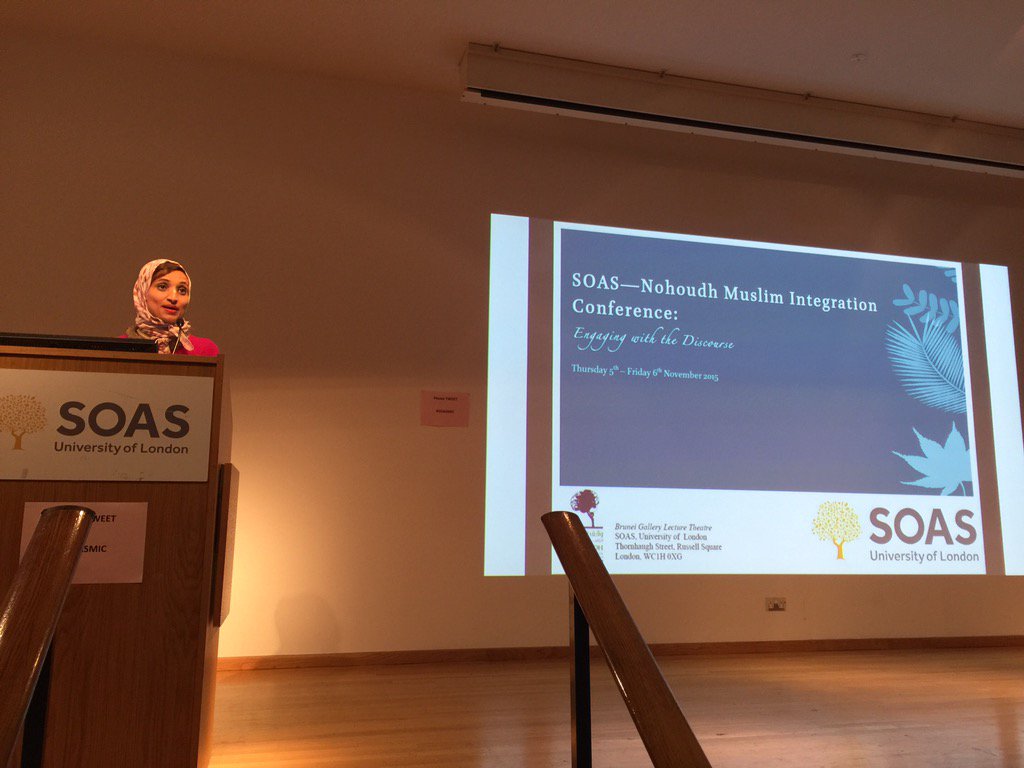
What does integration actually mean? What does the integrated British Muslim look like?
A British woman joined ISIS mother of 5 children, said ‘they were just not my cup of tea’. Here is a woman who joined the group contrary to British values who referred to a very British statement.
Last year the Sun newspaper ran a headline which read ‘United against IS’ with a union jack hijab, the paper cried out to be British. What if a British Muslim disagreed with the campaign, does that make them less British or less integrated?
British values become a synonym for counter-extremism. There definitely is a problem of young Muslims joining extremist Wahhabi ideology. Fear of being labelled deviant or against British values – Muslims feel the need to defend their stance time and time again.
Poppies hijab appeal used to defy extremism – these anti-extremist gestures taking place on Muslim women’s heads used as tokens. The question is why is it that Muslims should go the extra mile – multiple poppies on their head as opposed to one.
The Prophet had British values, the author (didn’t catch the name) was critiquing counter-extremism policies and argued through Islamic values we can counter such government strategies. Fear of remaining silent otherwise our loyalty will come into question. We need to ask in the debate, who speaks for and about British Muslims, how do we present a variety of voices on behalf of British Muslims. Look back at how empire relied on their subjects to sustain itself.
Government taking on small elites as advisors, whom are the careerists taking on roles reporting against British Muslims. Fortunately at Channel 4 News, we are countering the establishment – however the rise of Wahhabism is worrying in the UK. As someone in the media industry there is a disproportionate outlook on British Muslims – based on pre-existing fears. Most journalists are not likely going to be challenged when concerning Muslims unlike other minority groups. There is no cost in making mistakes or misleading audiences. The hysteria surrounding the Trojan Horse scandal – misleading news story about Muslims taking over schools – subsequent investigation found there was mismanagement and incompetence in governance and no evidence in sustained plot or takeover. What must good journalists do?
Muslim women are used as a football in these debates.
Panel 1: FRAMING MUSLIM IDENTITIES: MEDIA REPRESENTATION OF MUSLIMS & ISLAM (CHAIR: Fatima Manji, Journalist)
Nafeez Ahmed, Muslims As Suspects – Why the Prevent Agenda is Demonising Dissent and Radicalising Communities
Sundas Ali, Muslims in the Media – Unraveling Preconceptions
Noureddine Miladi, The ‘Terrorism’ Frame: British Muslims and Islamophobia in the Media
Farrah Sheikh, Locating English Muslims, Racialisation and the Challenge of Whiteness
Extended Question and Answer session
Nafeez Mosaddeq (journalist) – Muslims as suspects – why the Prevent agenda is demonising dissent and radicalising communities?
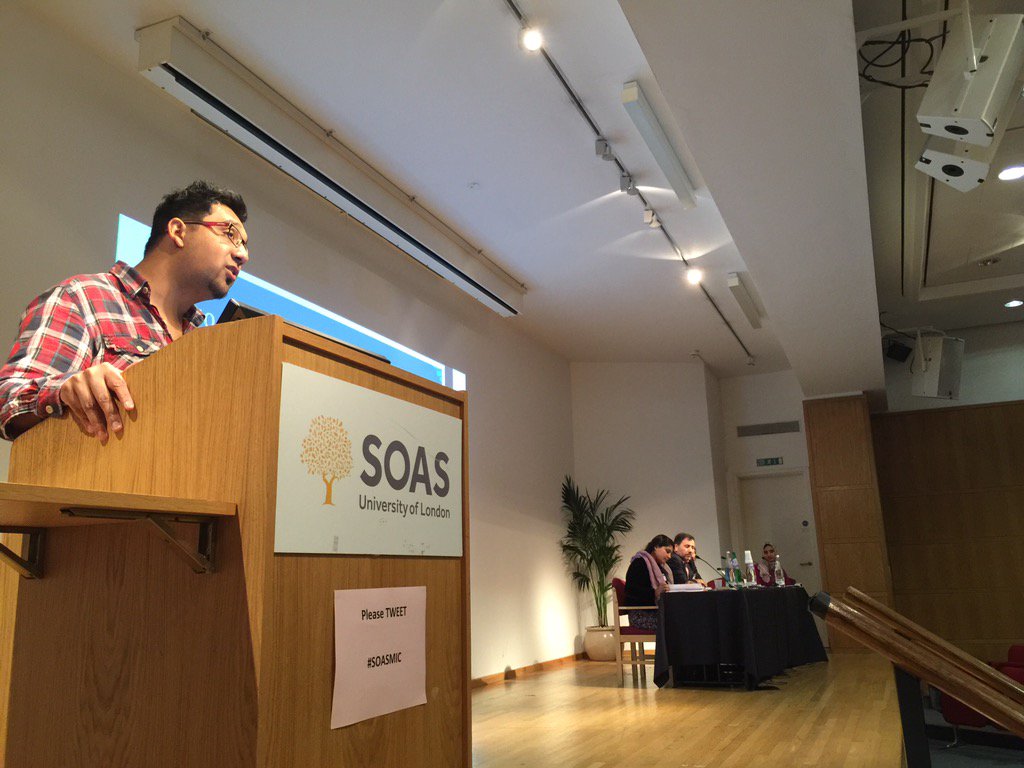
Majority of people in this room are not extremists (show of hands) Minority of the audience believe that counter-extremism has worked. In terms of COIN there are similarities with neo-con foreign policy goals and warfare and energy. Looking at RAND documents 2004-20011 – founded by US Air force, series of documents and development of these reports were carried out by neo-cons. Chair of Women Without Borders, infamous RAND report , government should engage with Islam to deal with COIN. Divide and rule strategy, Orientalism at its worse – traditionalists/moderates/Sufis/Secularists play against each other.
George H W Bush administration elaborated the idea of divide and rule strategy document. First ways of which this was enacted was the Sufi Muslim Council – now Director of Quilliam and Craig Murray from FCO and funded by CIA. Efforts to make best friends with Uzbekistan to open up gas resources and pipelines – create a pseudo Islamist project was state-backed Sufism. The government decides what moderate Islam is and if you fit outside of this framework you are detained, imprisoned and tortured.
‘We need to support a Sufi Islam construct in Britain to gain a position of influence.’ The reality is these policies took place in Qatar, Saudi Arabia and Pakistan who are our allies against ISIS – what we have is a strange situation is the same government is putting forward an Islamist government construct which is moderate Islam, creeping militarisation and backing militants in Syria. Completely contradictory and as the government is fighting itself – making allies with those who we want to make alliances with.
Sundus Ali, University of Oxford, Muslims in the Media – unravelling preconceptions
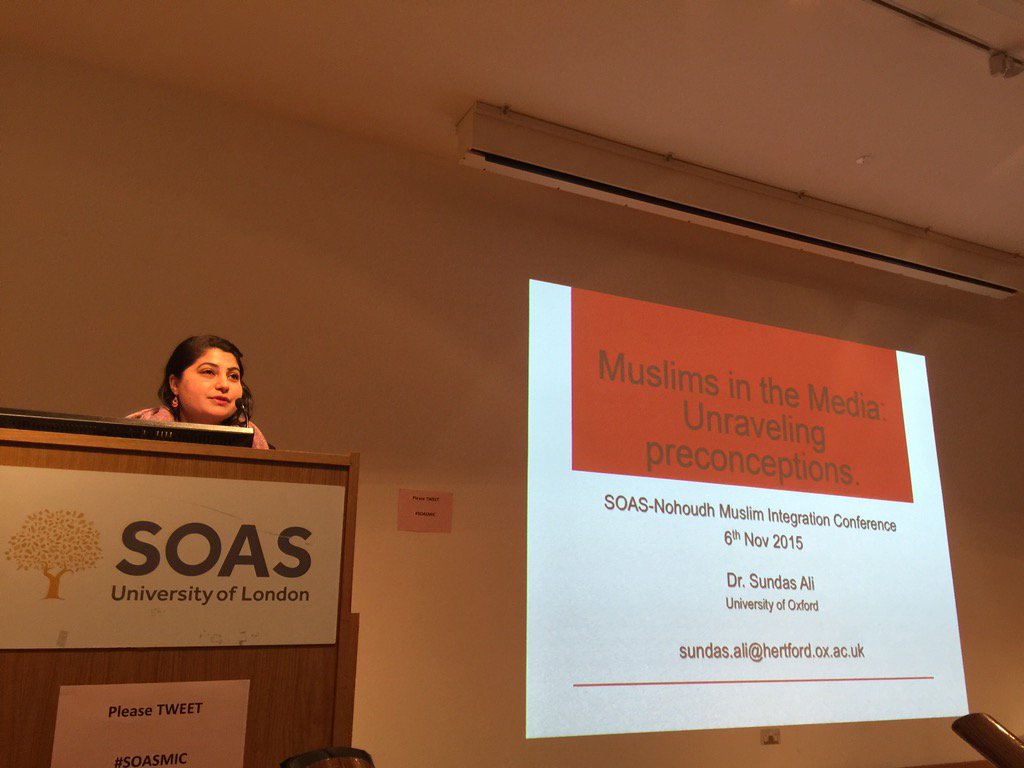
Muslims in the media, I have included my interactions with Muslims in the media and also my academic work. Muslims and the media are both contentious terms today and there is a lot of debate surrounding them. Does the media represent Muslims in a positive light? Both actors are puzzled – Muslims and the Media.
The media can be supportive as it can change the narrative on terrorism and extremism – there are positive structural changes. Journalists become very excited with data as it is neutral. I found that there was a general interest from journalists about what is the answer to integration issues? How big a role does deprivation play? Living in the most deprived areas in the UK affects employability. Engaging with the media will cover negative stories and the media can be supportive including with the data. Genuine hunger to learn about Muslims, what do you think journalists need to do? Session on the BBC, just as the media is puzzled with Muslims so are Muslims puzzled with the media. I found that there are certain actors within the media who want to play out certain narratives. Muslims must engage more with the media and reach out to the positive work they are doing because they are a minority in Britain.
Example of Nick Ferrari interview on radio was attacking poor language skills. The MCB report through the power of data was able to challenge his view as over 60% speak two or more languages.
Newspapers do have a bias when reporting Muslims. Conclusion is to bridge the gap between Muslims and the media.
Noureddine Miladi, Associate Professor, Qatar University, The representation of Islam and Muslims in the British tabloid press
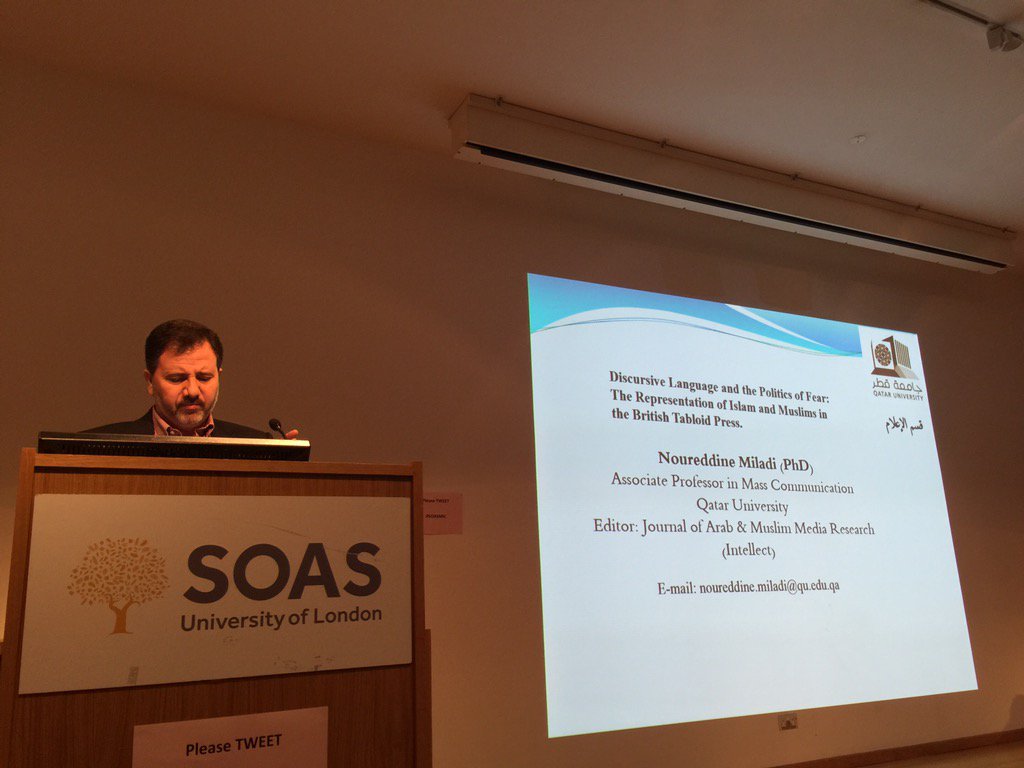
Discussion of language and the politics of fear, some of the tabloid presses creating a specific discourse on Islam, faith and culture. Most of the western people learn about the Islamic world, the Middle East through the zoom lens of the newspapers they read, television and British Muslims > dress, culture, music: pure interpretation of current affairs and of the Orient through mass media. Anti-Muslim sentiments following the Charlie Hebdo publications is telling of the (mis)representation of Muslims. The global war on terrorism since 9/11, has used language of ‘crusade’ to further the policy of US army invasion of Afghanistan. Not only the work of media, but thinks tanks, lobby groups, policy-makers advancing the framing of the Muslims.
The study is partly based on the analysis of article headlines and contents of selected tabloid newspaper articles (over 300), looking at headlines, some parts of the article. The theoretical underpinning, discourse analysis, the linguistic meanings, findings of the term Islamist, IS, Hijab, Niqab and Shariah. Under the study of 3 newspapers, Islam is the submission to God or Salam (peace), whereas the term has been combined with Islamist groups, Islamists terrorists. All violent groups were defined as fundamentalists, or violent extremists > denotes to talk about the Muslim Brotherhood of Islamism (political change through peaceful means). Through the research and what has been very clear is that the word Islamist has been used to convey the concept of terrorist/terrorism, which is now being associated, by the reader and/or viewer. ISIS, does not anymore signify any aspect related to the principles of ruling or governance under an Islamic political system.
Farrah Sheikh, SOAS –Nohoudh Scholar, ‘Locating English Muslims, Radicalisation and the challenge of whiteness’
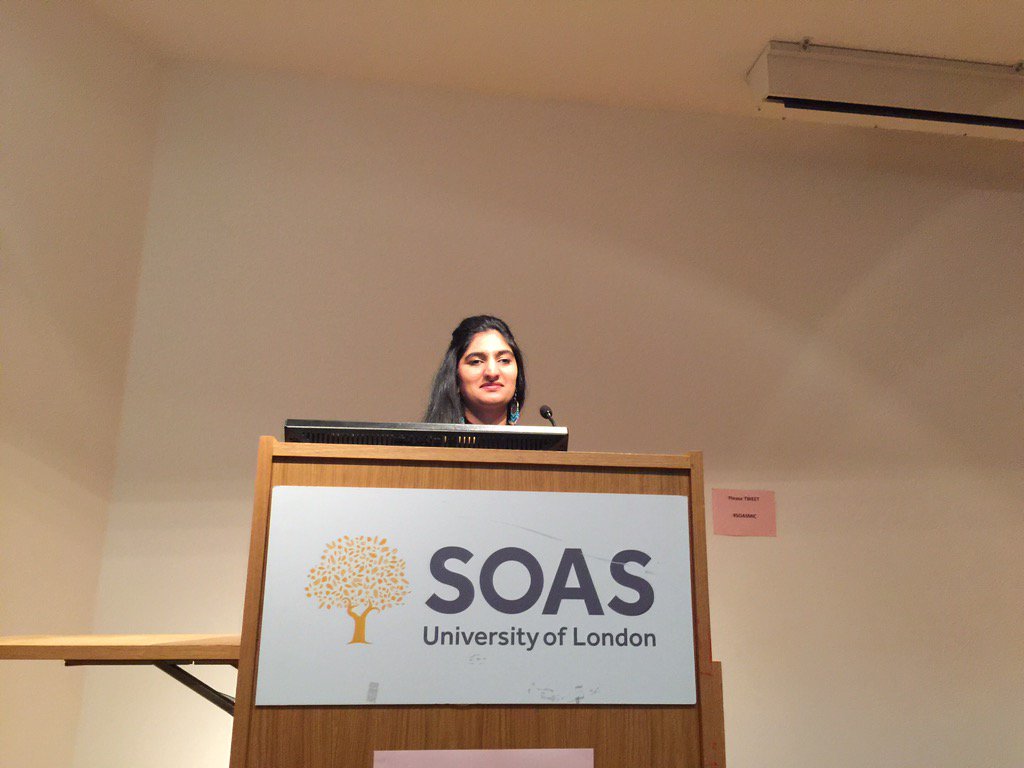
I felt some of the presentations yesterday set out how we should look into whiteness, Englishness and Britishness. Drawing on fieldwork data, looking at minority and majority- Where is England’s research on Muslims?
It is suggested that British Muslims are different to English minorities, ensuring that the English whiteness is preserved. I want to talk about the issues of identity, Britishness and self and the colonised subject and what happens to them after mass migration.
Empire ‘messes’ with identity – disrupts the natural, cultural and national identity development. The mixing up of Englishness and Britishness suggests that there is a loss of identity in Scottishness, and Irishness.
A subject of the monarch? Born in England, you can ascribe to the nation. Enoch Powell asserts the need the English and British culture as two separate entities. His ideas are not new and 19th century historians have sought the same argument. For me, place is an important part of English identity because from the 1950s > English identity separates from the racially pure.
Place was an exceptional marker of identity when the two were separated. However, Muslims shared their borders with others, i.e. the Empire has come home. West Indies was now considered to be British because of the occupation of space.
London, Leicester and Norwich > many respondents referred to Britishness as political identity. Some argued they did British values better than Brits themselves. Others became very emotive; they didn’t understand what it means so how can they be part of it.
Dean, a man in his early 30s from Leicester and African decent; I am English, born and bred in England and hold a British passport. I am proud of my country and proud of city. Despite roots in East Africa, Dean associated himself as English not by nature of his skin colour but because of space, speaks the same language and able to communicate to others. Englishness, for Dean, is connected to language, space and place. Despite Dean saying that he was not cultural at all, but he would take off shoes when entering and give salams to the empty rooms – sufi approaches.
Dean challenges the appropriation of the terms of Whiteness, Englishness and Britishness > Dean was one of the few of the 50 or so who self-identified with Englishness. Muslims seen as one pertaining to race and identity – Islam and Britishness/Englishness.
Q&A
Mohammad Amin; We are quickly to homogenise the media, why?
Sundus Ali: Muslims and the media are equally puzzled, there is a genuine need for interaction and yes I did not speak much about the media and what it entails and yes the media is not homogenous. It is a diverse tool, online media and TV stations etc. Both Muslims and the Media need to be unravelled, necessary to engage.
FM: Sundus, do you really think journalists want to know more about Muslims?
SA: Yes they might have a story to tell, but Muslims must reach out to provide research and offer data and stories.
Question: How do you define a Muslim identity?
FS: Excluded 1st generation of Muslims, interviewed Muslims who are 21 and above. Muslims of different backgrounds, I did not say who is and who is not a Muslim. I have collected interviews from across the spectrum from traditional Sunnis to Ahmadiyyah, Iraqi Shia perspectives and Pakistani Shia perspectives. I was really concerned in producing another piece of work which present the British Muslim story from one angle. There was a lot of anger during the interviewing process and was able to capture different views/opinions which were not acknowledge beforehand.
Fatima Manji: Is there any need to engage with the Media?
Noureddine Miladi: From broadsheets we get a more balanced perspective on Islam and the representations of Muslims. Muslim should not stay idle and should be proactive in changing the journalist stories and themes and impacts.
FM: Could you offer your insight into offering names to COIN?
Nafeez: My wife works for MYH and was working on shared values, hacked into my wife’s email account and had access to personal email accounts including mine. It was quite worrying. We communicated with these people with regards to what the MYH wanted it to be and they were juvenile and talking about taking a shotgun to my wife. So we went to the police with my wife, after filing the report. The police informed us that the whole issue was sent to counter-terrorism. They published address, public accounts and I was invited to the Channel Programme, can we not have a normal police investigation? This is not a terrorist issue, yes they are extremists but it didn’t occur to me that this was going to lead to this escalation. Turned into a national security issue, I’m highly critical of counter-extremism and Prevent but I am not saying there is no extremism, there are problems in our community.
Comment: Difference between the national and local press, local press could not afford to attack or antagonise Muslims, there is a market issue. I am pretty certain that the Metro does not have a Middle East correspondent. 90% of the stories, which refer to Islam and Muslims, are found in Europe and Middle East.
Question: Iranian Prime Minister example of wiping Israel off the map, how can we engage with intellectual prostitutes who distort translations?
Question: Demonisation lens of Muslims within the Muslim community who work with authorities. This mutual fear has created a deep suspicion. How can we encourage the media to lower the suspicion of the media?
Answer: Engagement is the key, offer stories to journalists.
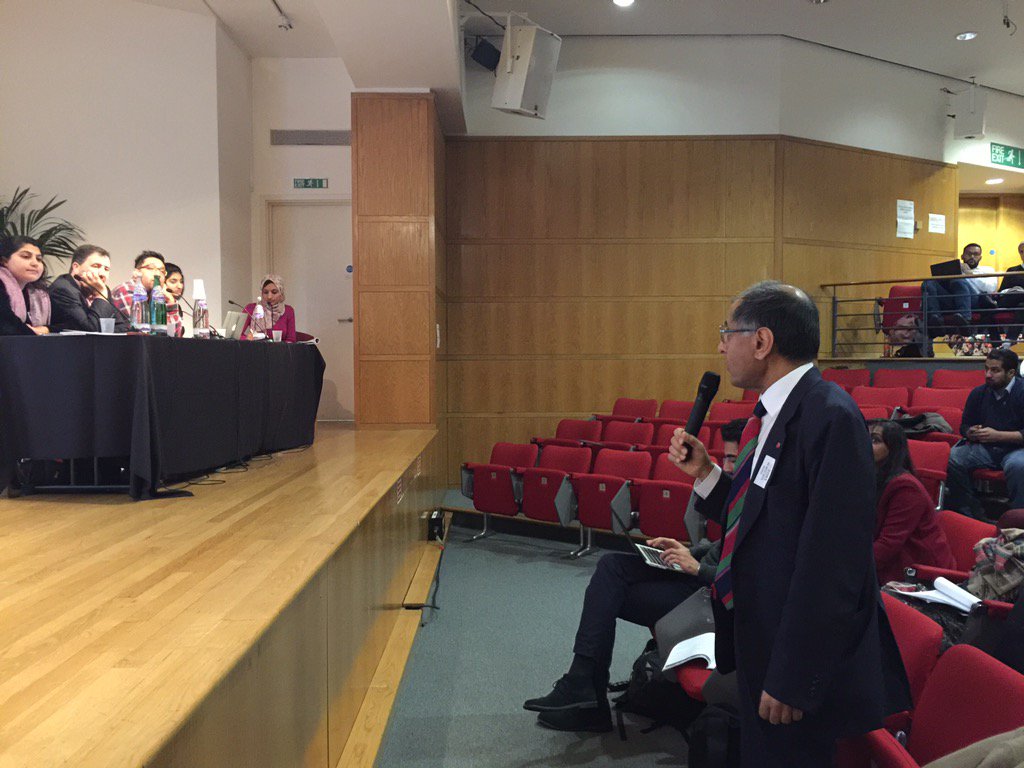
11:40—13:10
FREE SPEECH, SELF EXPRESSION & SILENCING DISSENT (Chair: David Feldman, Birkbeck)
Omar Salha, Diplomacy, Sport and Islam: Tackling Islamophobia through Faith and Football
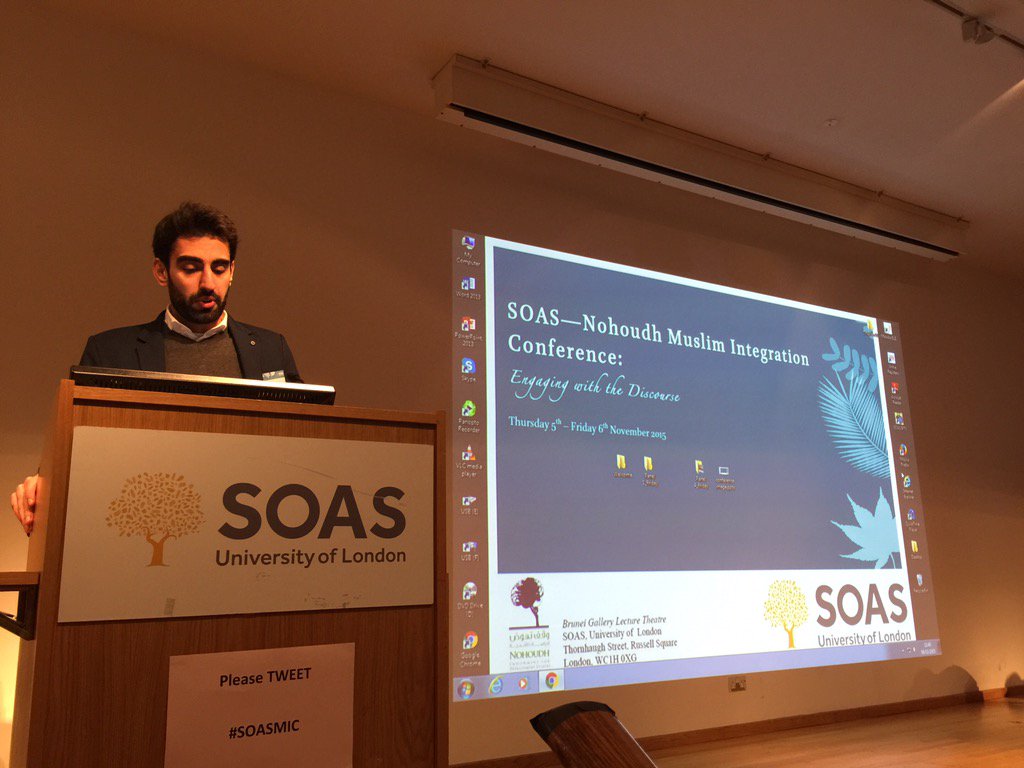
Starts with quote from Nelson Mandela that sport is more powerful than governments in breaking down prejudice and discrimination. Conferences have long connected the role of sport in other aspects of life like education, etc.
Premier leagues and other leagues attract players worldwide – big industry with much money. There are also problems of hooliganism. Discrimination of Muslim players is something to be addressed here.
OS argues that Muslim footballers attempt to promote international and symbolic aspects of Muslim life. Symbolic power is a theoretical frame here. For example, reactions to a player being offered a Champaign bottle on live television: “I am Muslim I do not drink alcohol”. So this ritual was changed from Champaign to a trophy. This is promoting Islam.
Another player lifts his shirt to show Eid Mubarak – or by prostrating on the field after scoring a goal. Kids playing football have been spotted doing this. You can also to this in a FIFA game!
Ramadan is also relevant here. Muslims players insist on fasting. Arsenal player says his team would rather he didn’t fast. He takes questions from them as an opportunity to engage with them about Islam.
In Cricket, Ali’s beard is one that should not be feared. But there are cases of discrimination as well. Middlesbrough and Newcastle in 2007, for example. The game was a draw but Newcastle slandered Mido – bomber, terrorist etc. Some fans even ripped out pages of the Qur’an.
Anti-Semitism and Islamophobia are being addressed in sports. Football Association (FA) have acknowledged the good thing of using Muslim footballers as a means for a positive image of Islam.
Peter Morey, Framing Freedom
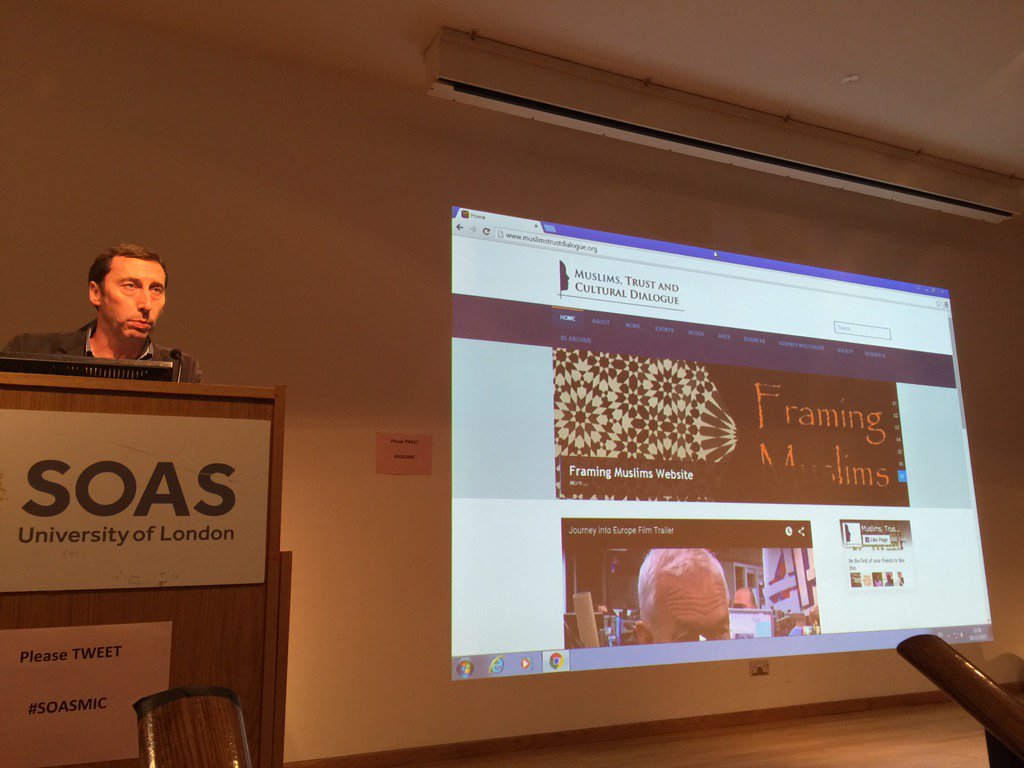
Freedom of Speech needs to be spoken about in terms of broader British values. Argues for cross reading between popular culture, media and politics. The discussion of freedom is framed in particular ways as a mode of containment – producing what will count as reality.
Freedom is from the West. Being un-free is from a backward culture. But freedom needs to be retracted in some respects to help it in others. Universities are supposed to be places where simplistic exclusivist views can take place.
But banning speakers from university is not freedom. The elevation of freedom of speech is tenacious and divisive. People defend use of images to deliberately offend others. What is overlooked is that free-speech fundamentalism is absolutism. Power to offend is a display of dominance. They think they’re being free but it’s not.
It’s unhelpful to see freedom and culture as separate. Need a more dynamic understanding of difference to see that we can align ourselves with shared values and the good society. Culture should be defined as the construction of human action in a context of an agreed reality. We need to negotiate a poly-cultural world. Not to destroy the integrity of a culture involved. We need to see them as historically situated and subject to potential compromise and change.
Farrah Sheikh (SOAS-Nohoudh scholar), Prevent
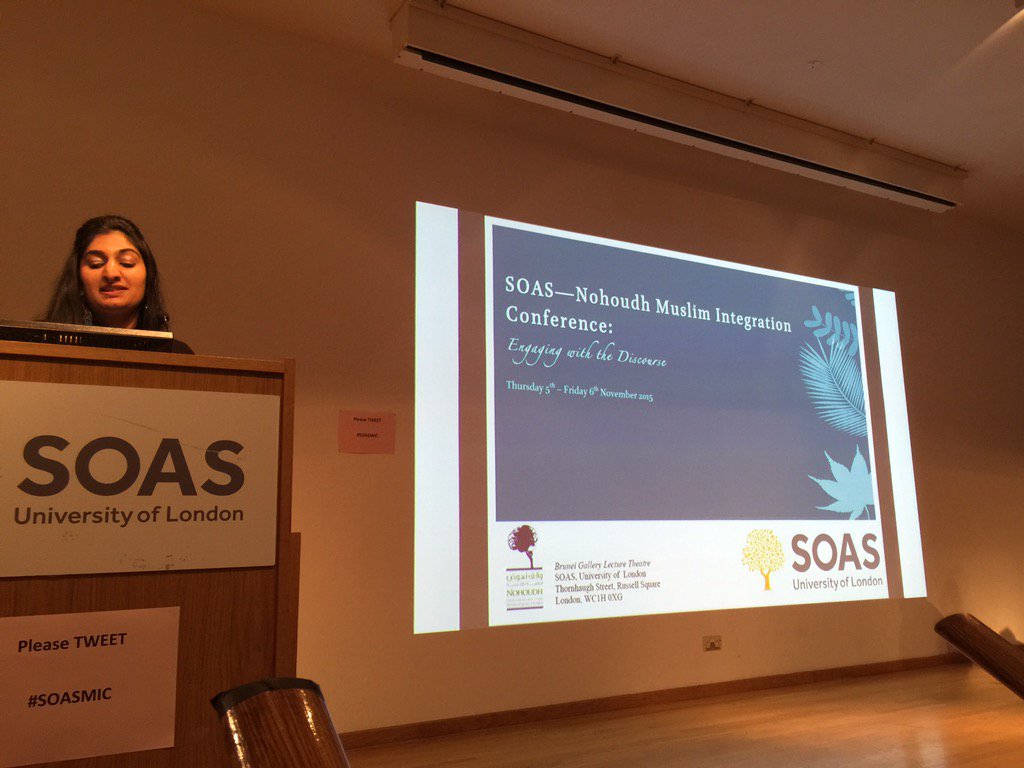
The state engages in making Muslims as the other. Homogenising national narratives to exclude Muslims. The Other is recognised by hijabs and beards. Legislation testifies to this. 2013 task force report – any policy changes? It defined Islamists – distorted interpretation of Islam which ignores its peaceful principles and instead base it on the like of Sayid Kutb, seeking to get Caliph and that you can’t be Muslim and British. Farrah says who is the state to tell us what is true Islam and what one should read? This affects us because we might read or own the wrong type of book and therefore could be penalised for it.
Muslims are singled out for discrimination in policy. People claim that Muslims need to integrate better. Farrah found that 9/11 was the most memorable news story in their life. This is because it was a turning point for their lives. People felt the after affects. Muslims interviews were not OK with needing to apologize for the acts of other Muslims. When do you apologize for someone relating to your religion? Why are we apologizing? he says.
Construction of young man, rootless and angry, caught between two worlds. State is trying to alter lives of Muslim it deems dangerous. This happens through Prevent and Counter Extremism strategy often at the expense of freedoms. Repressive policies seek to erase Muslim identity. The state is contributing to Islamophobia since being Muslim is increasingly being scrutinised.
David Aaronovitch (Journalist), Free Speech, Self Expression & Silencing Dissent
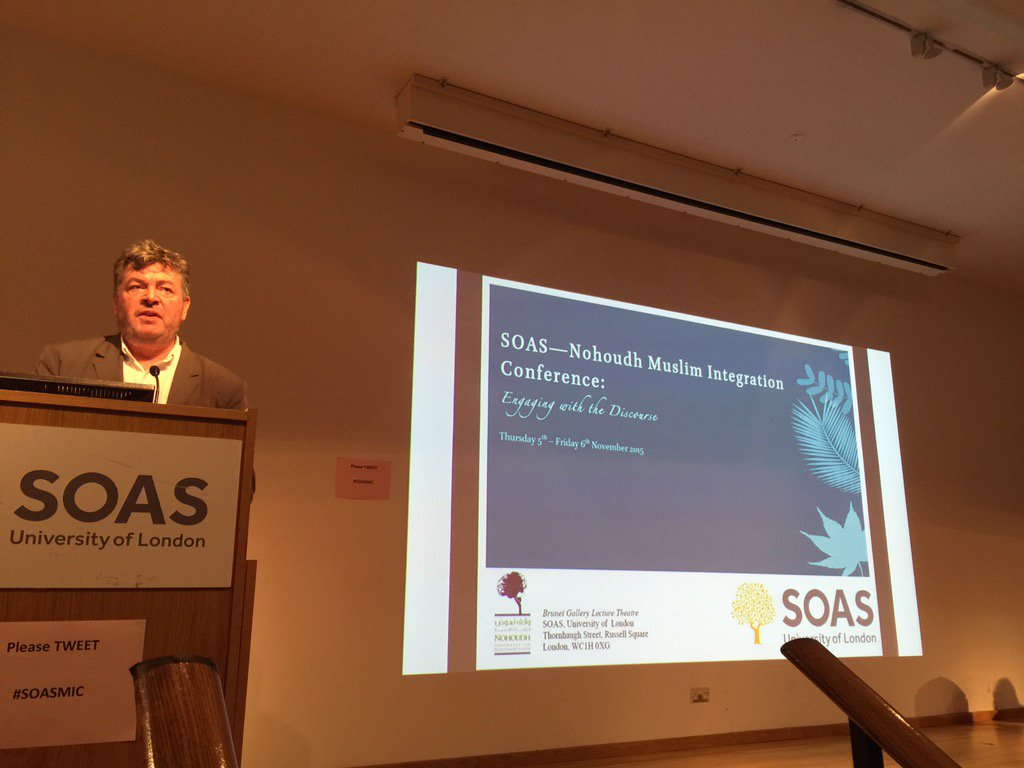
Need to think why we have a Prevent strategy in the first place. He wants to take up Peter Morey. Agreed with West has had monopoly on Freedom of Speech. A reason for this is because of the recent experience when we did not have this. Behind the Iron Curtain, there was no freedom of speech. You could be prisoned or taken away for anything against government until 1989. Even Western Europe had little freedom in part of Western Europe.
Censorships until 1960 – books were banned until then if too sexual deviant, for example. So these freedoms are relatively recently gained. That’s why we champion them. Then new minorities came in due to the value of tolerance. So people were allowed in based on these wonderful liberal values. Gay marriage is an example and very recent.
There are many people who have nothing to do with Islam who are enemies of free speech. Moscow for example. So can’t say lack of free speech is just about Muslims. Can’t reduce people just to their religion. The Rushdie affair sparked off a lot. People then wanted to assert their identity as Muslims. Western liberals split on this. Some say he shouldn’t have provoked people this way. Others said people should have robustness and capacity to take such “offensive” content.
Secularism is what gives the Muslims the right to practice their faith and come to countries like this. Conferences for example, can’t exist in say, Saudi Arabia. So the tolerance is reason why we are able to do this. So secularism is the underpinning of our capacity to exist.
So Muslims and everyone have an enormous interest in defining freedom of speech as broadly as possible because it allows us to do what we need to do.
Katy Sian, Prevent(ing) free speech and dissent in Britain’s Universities’
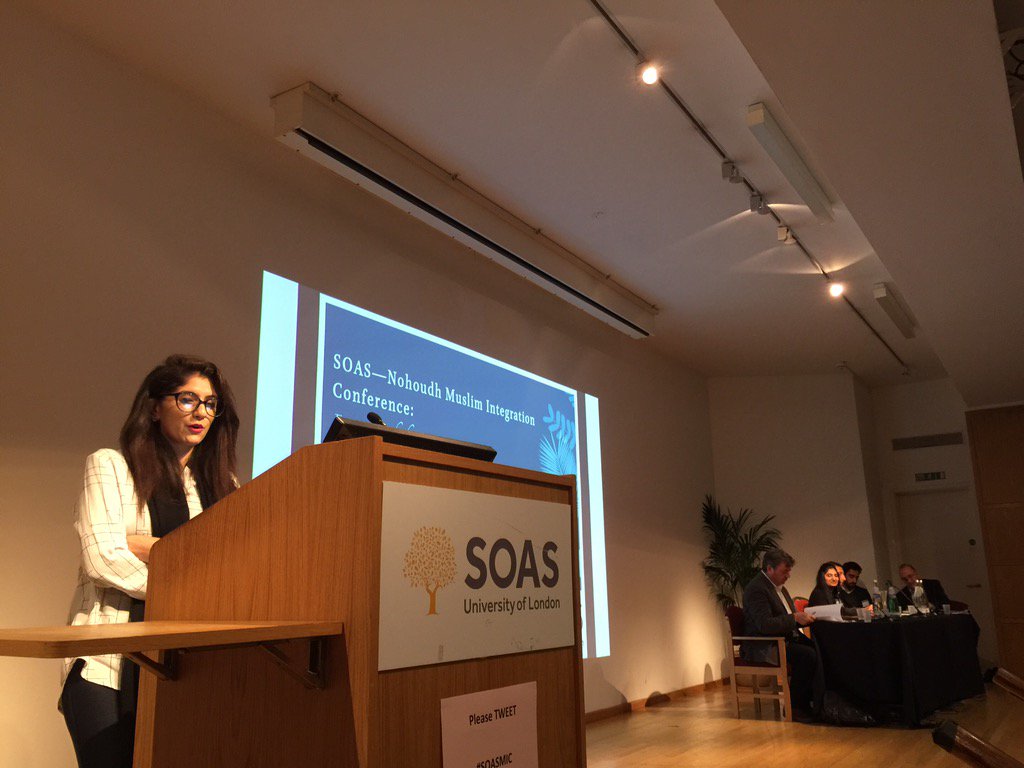
Prevent training and schools and security acts. Several school teachers interviewed. Teacher were asked to see if students of family members were visiting Pakistan for long periods, or if they had video cameras out, or were playing oddly with shampoo bottles. Spying on 5 year old Muslims was not seen a problematic. So PREVENT is very invasive. This destroys privacy which liberals try to defend. This goes on – hijabs, beards, not shopping in M&S, clock bombs etc. It’s a consistent problem. Assuming mundane things are signs of extremism.
Under the counter-terror and security act, universities have to report potentially extremist behaviour. This is dangerous as well. Universities should allow debate and dissent. Without this, what’s the point of university? Many universities have cancelled debates on things to do with Islam. Encouraging Critical thinking and being a police informer is problematic.
People getting done for reading books relating to their courses. Part of an MA of Global security and terrorism. Student was interrogated. This is a worrying climate for Muslims.
For Prevent to work, it must be able to spot an extremist. This is not possible so the characteristics to look for get longer. Islamophobia is not just about being mean, but policies are being used to roll back civil liberties for all of us.
Integration is not seen as a good thing at all by Katy. Forces people into a certain way of living and whoever doesn’t make it suffers. Integration is a pursuit to loyal ethnic subjects and Prevent is an extension of this.
Q & A
Muhammad Aziz: People don’t understand that Prevent is just one part of a wider project: ‘Contest’. The other parts of this project have, in Muhammad Aziz’s opinion, been very useful in preparing and protecting us from extremist and terrorist activities. MA concedes that Prevent is not working, but there seems to be confusion about what it’s about.
Panel 3: ISLAMIC FEMINISM, GENDER, AND SEXUALITY (CHAIR: Samia Bano, SOAS, University of London)
Ziad Amir, Changing Perspectives on Muslim Polygamy: From Victorian Attitudes to Online Comments
Amra Bone, Islamic Marriage and Divorce in the British Context: Do shari`a Councils Reinforce Unacceptable Patriarchy in the Muslim Communities Or Are They In Fact An Essential Tool In The Liberation of Muslim Women?’
Shuruq Naguib, Gender, Religious Authority and Islamic Education in Britain
Amanullah De Sondy, The Crisis of Islamic Masculinities
Extended Question and Answer session
Ziad Amir – Changing Perspectives on Muslim Polygamy: From Victorian Attitudes to Online Comments
- Certain criticisms of Islam wax and wane according to how British values change.
- Explains a negative fascination with polygamy on the part of Western commentators.
- Contrasts historic perspectives from Latin sources and Victorian times and ‘fasts forward’ to contemporary article from the Daily Mail about a Cambridge student who dropped out of university to marry a polygamous man with 2 other wives.
- Many of the online commentators focused on the illegality of it, frustration at double standards and PC-culture, jest on the ridiculousness of the situation. A recurring concern was dependence on state benefits.
- The reasons polygamy is seen as reprehensible differ for different times
- Victorian commentators were at a distance from Muslim world and there was no sense of threat.
Amra Bone – Islamic Marriage and Divorce in the British Context: Do shari`a Councils Reinforce Unacceptable Patriarchy in the Muslim Communities Or Are They In Fact An Essential Tool In The Liberation of Muslim Women?’
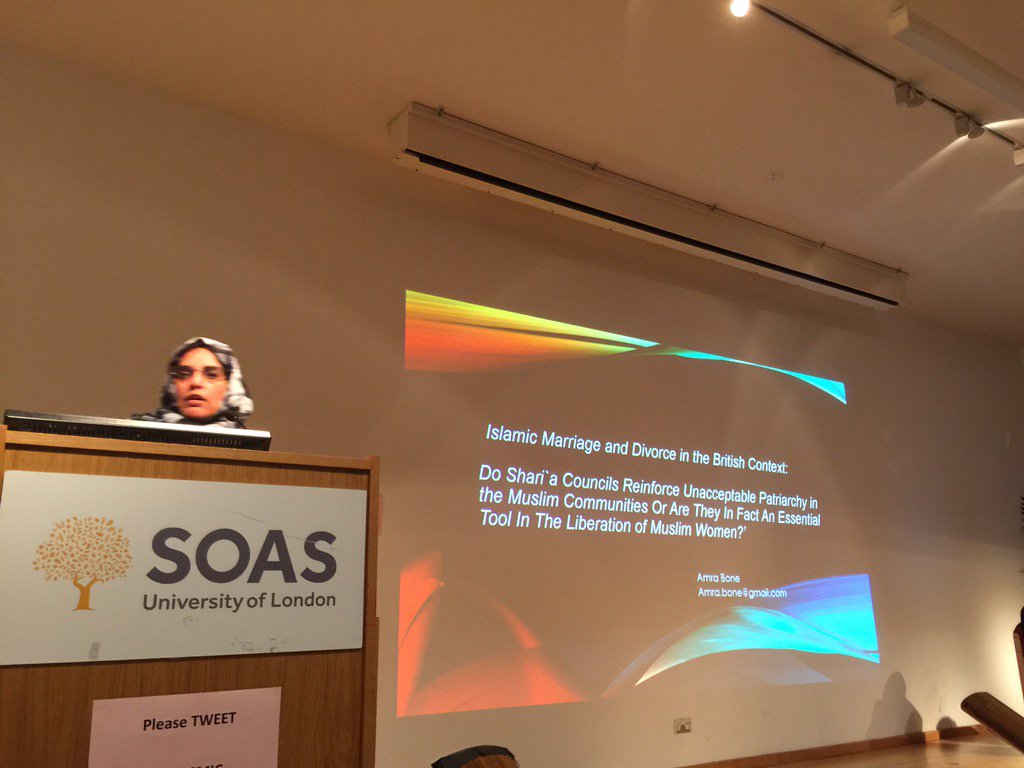
- Stereotype of sharia courts as full of mullahs with beards. Amra is evidently not and she serves on one in Birmingham.
- Baroness Cox criticised sharia as inherently discriminating on Radio 4 Women’s Hour
- Historic account of Westerner being baffled by multitude of opinions
- The Christian tradition has had a problematic relationship with divorce.
The Anglican Church has only recently allowed divorcees to remarry in Church
- In Islam marriage is a contract.
- Worldwide examples:
– Tunisia polygamy is banned
– In Pakistan man has to give the state 90 days notice to assess whether he is able to take a 2nd wife.
– Recounts the personal and family laws in various Muslim countries, eg. Morocco, Indonesia, etc.
- The work of the Sharia council
- Common assumption that divorce is just a triple pronouncement
“We have a lot of educating to do”
- A lot of cases of abandonment – leaving a woman ‘hanging’ as forbidden in the Quran
- They do not have any legal leverage or force, and occasionally have to write letters to offending husbands.
- Concerns about unregistered marriages
Shuruq Naguib – Gender, Religious Authority and Islamic Education in Britain
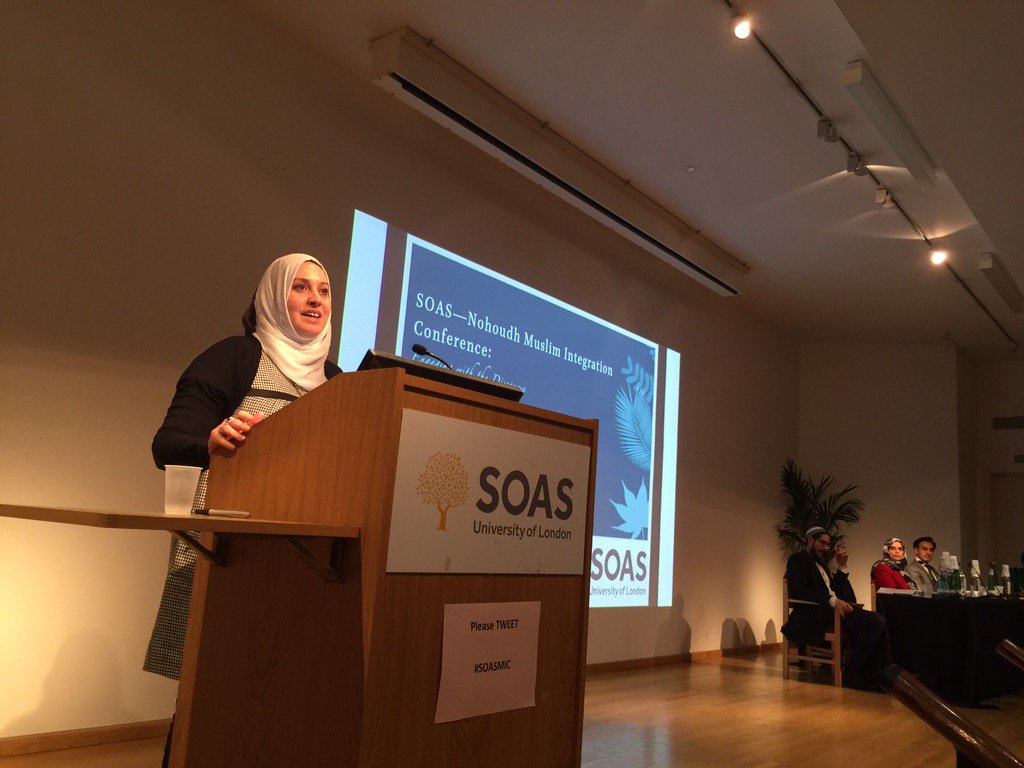
- “Muslim Women Reading the Religious Texts”
The project was motivated by a frustration with a bifurcation between the textual study and social scientific approach to Islam. Draws on the work on of Talal Asad and and Saba Mahmood- ‘discursive tradition’ and religion constitutes a community of meaning.
- Increasing participation of women in institutions of religious learning
How does this effect female interpretive agency?
- Outlines different case study sites.
- Constructing their interpretive agency as enabled by the training.
- In terms of literary tradition we have no extant tafseer from the pre-modern period by a woman
- Jameal Kauther
– Student reflects on Quran as an ongoing conversation with God
– Have you seen how the camels were created?
– Fuses the text of Quran and here biology class.
- Theroetical reflection using Heideggar and Gadamer
Amanallah De Sondy – The Crisis of Islamic Masculinities
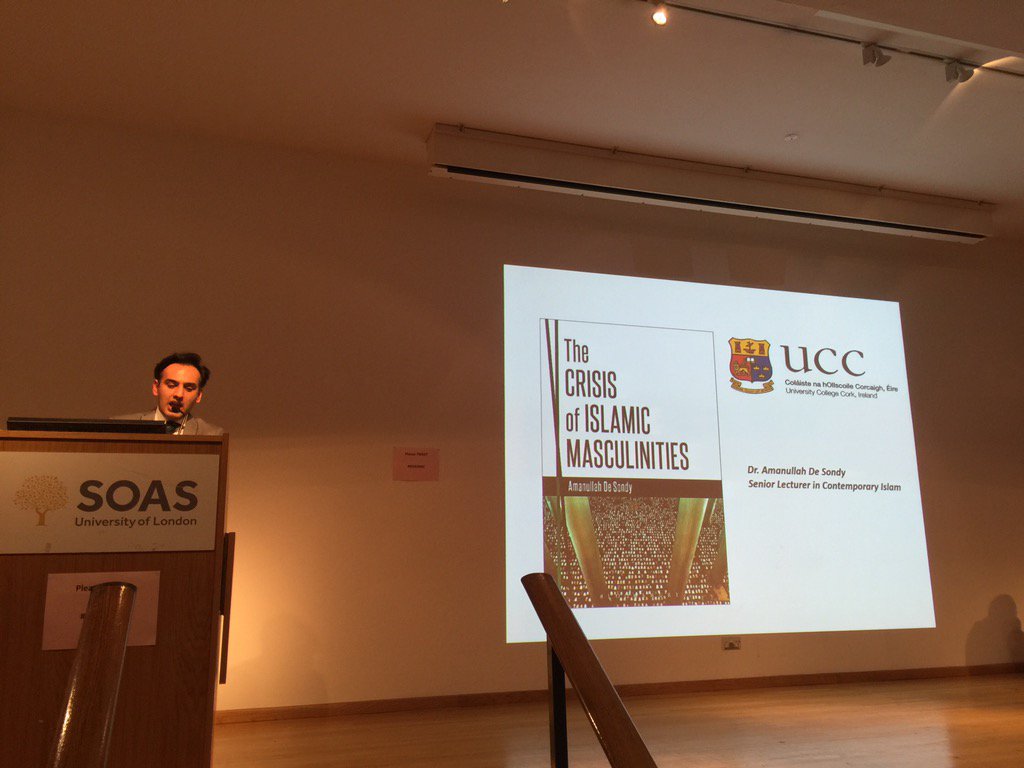
- Problematises the understanding of an imaginary centre point
- Reflects on his interests and how he came to the study of masculinity
- The Quran has no single gender ideal
- His book exploration begins with Maulana Maududi – “an aggressive and rigid interpretation”
- Interrogating monolithic ideas of masculinity and femininity
- Quran as inimitable, perfect and clear – argues it is ambiguous and dysfunctional
- Arabic suffocates forms of Islam established outside of the Middle East.
– Uses South Asia as a fertile land for counter-examples
- Examples:
– Mirza Ghalib – Hedonistic challenge
– Shah Hussein
– Malungi men
- Reformers are missing the point he argues
Question and Answer session
1) The govt will carry out a review of Sharia councils – needs credibility – who should carry it out – ministry of Justice already reviewed along with Samia Bano
2) Are women really not suffering according to Cox’s comment
3) Alternative to Khul3 (divoce initiated by a woman in Islamic law)?
4) Hijra community? – not directly dealt with but want to pose the question of ‘de-centering’ the discourse
5) Why daily mail?
– Shuruq critical of Islamic feminism. Positioning in a liberal post enlightenment paradigm that is not self-reflective.
– Shifting and reforming interpretations
– There are many margins and many centres depending on the context
– Darul Ulooms female graduates are marginalized because they cannot rise to level of Mufti and they are not validated to be able to be religious teachers in the mainstream
– Shuruq critiques Amanallah
– Do not want to create a normative model that doesn’t exist
– Ashraf: Was the girl’s personal approach accepted by her teachers or was it rigid?
– Have you offered the approach to scholars? – Controversy!
– We have a lot of assumptions of the conservative tradition that they only copy what is passed down and that what has been passed down is monolithic.
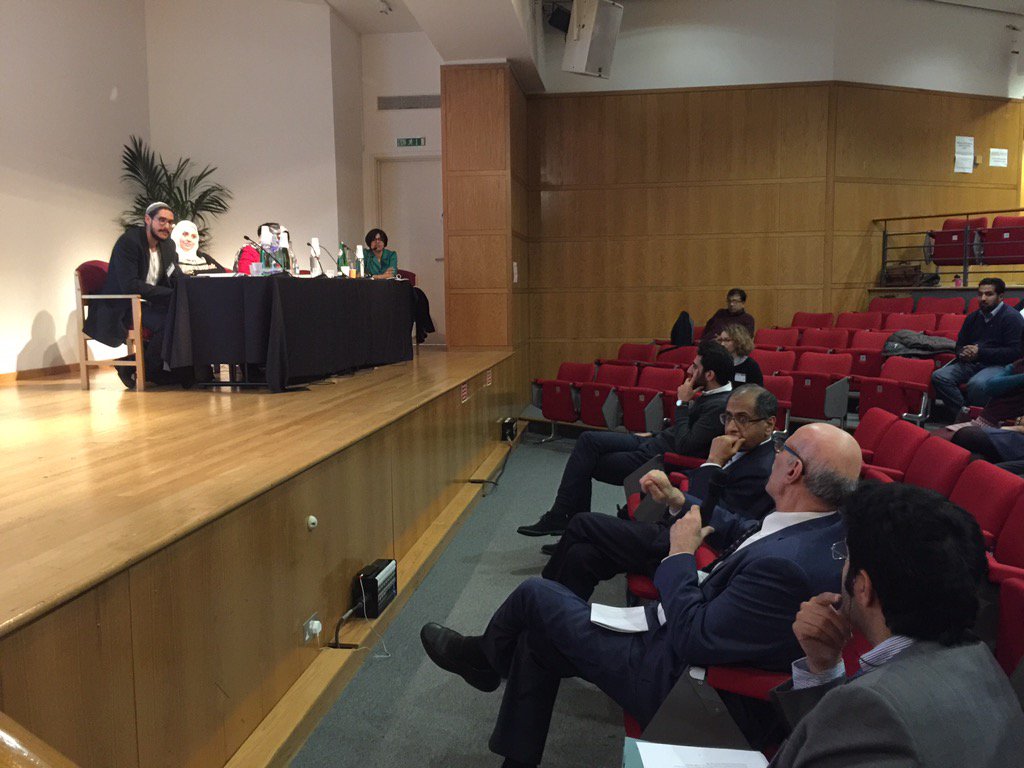
Panel 4: INTEGRATION, WHOSE RESPONSIBILITY? MOVING THE CONVERSATION FORWARD (CHAIR: Myriam François, SOAS, University of London)
Matthew Wilkinson, Our Way of Being British: A Philosophical Basis for Muslim Integration
Jørgen S. Nielsen, How European is the British Muslim experience? A comparative reflection
Aaqil Ahmed, TBC
David Feldman, A Model Minority?
Anthony Heath, TBC
Extended Question and Answer session
Matthew Wilkinson, Our Way of Being British: A Philosophical Basis for Muslim Integration
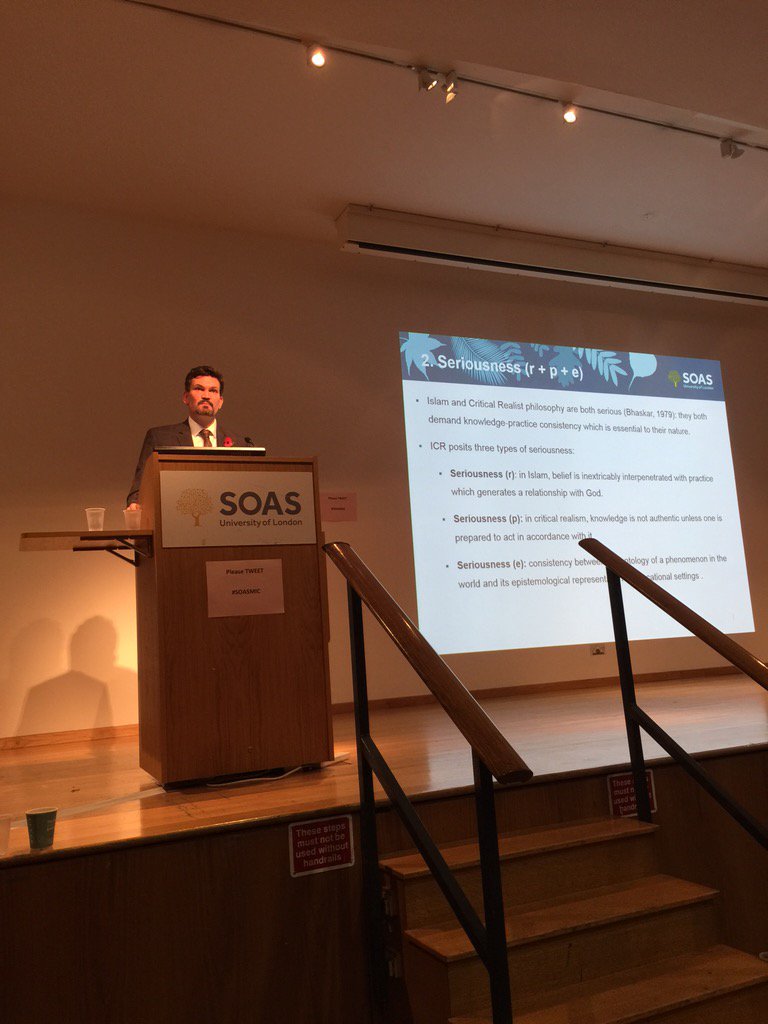
Assimilation models and multicultural models are unsatisfactory in Muslim integration. They don’t take into account that Muslim community is a faith based community. For Muslims, being able to practice their faith is what it means to be British.
Need to engage with Islamic tools for integration – especially Islamic Critical Realism which is part of modern Muslim theory.
Islamic Critical Realism (ICL) is a philosophy of religion that enables Muslims to engage with modernity. Foundational principles:
Underlabouring – clear away redundant philosophical concepts.
Philosophical seriousness – Islam and CR thought are serious. Islam, for example, belief and knowledge are strictly linked with practice. In CR, critiques are serious.
Ontological realism – God can be said to exist independently of our knowledge of Him.
The Qur’an represents a critical realist perception of life. It reminds us that we should be critical and self-critical. The Prophet’s mission was critically realist.
It’s an absence of Islamic practice and an excess of Islamic identity that has been the problem of Muslim integration.
Jørgen S. Nielsen, How European is the British Muslim experience? A comparative reflection
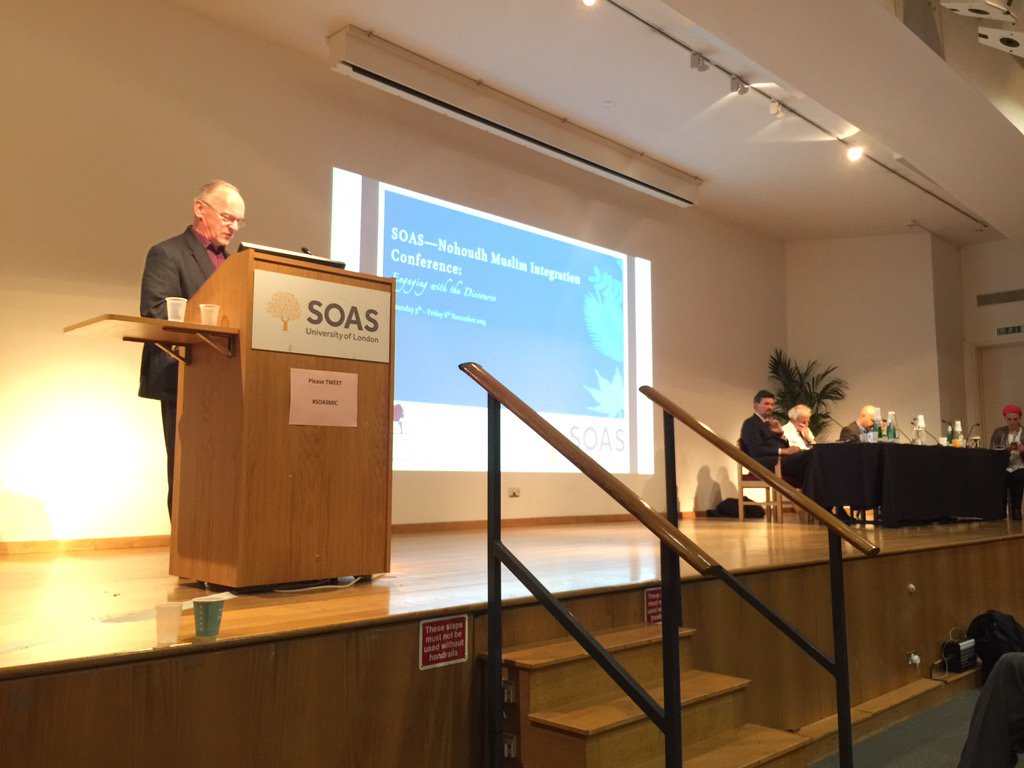
Britain is becoming increasingly secular. It seems as if the Church is cut back and other religions are being favoured. Constitutions in Europe do not guarantee equality of religions.
In Norway there is funding for Muslim organisations. This is increasing among Muslims in Europe. But there are conditions. European Commission policies are a major drive towards harmonization.
International events have shifted the discourse and practice. Iran going up in the media since the Iranian revolution. 9/11 confirmed rather than started the dynamic with Muslims. Right wing parties are growing in Europe especially in light of refuges which no one wants from Syria etc. There is therefore a right wing shift in European politics. Only way to be a Muslim in Britain, it seems, is to be a pacifist Muslim.
Muslims initially came as ethnic communities. But increasingly – they are becoming only known as Muslims. Is it replacing the old identities or becoming a new one?
We are seeing a merging of Eastern Europe with Western Europe – a merging out outlooks
Aaqil Ahmed, BBC and Professor of Media, The importance of religious literacy
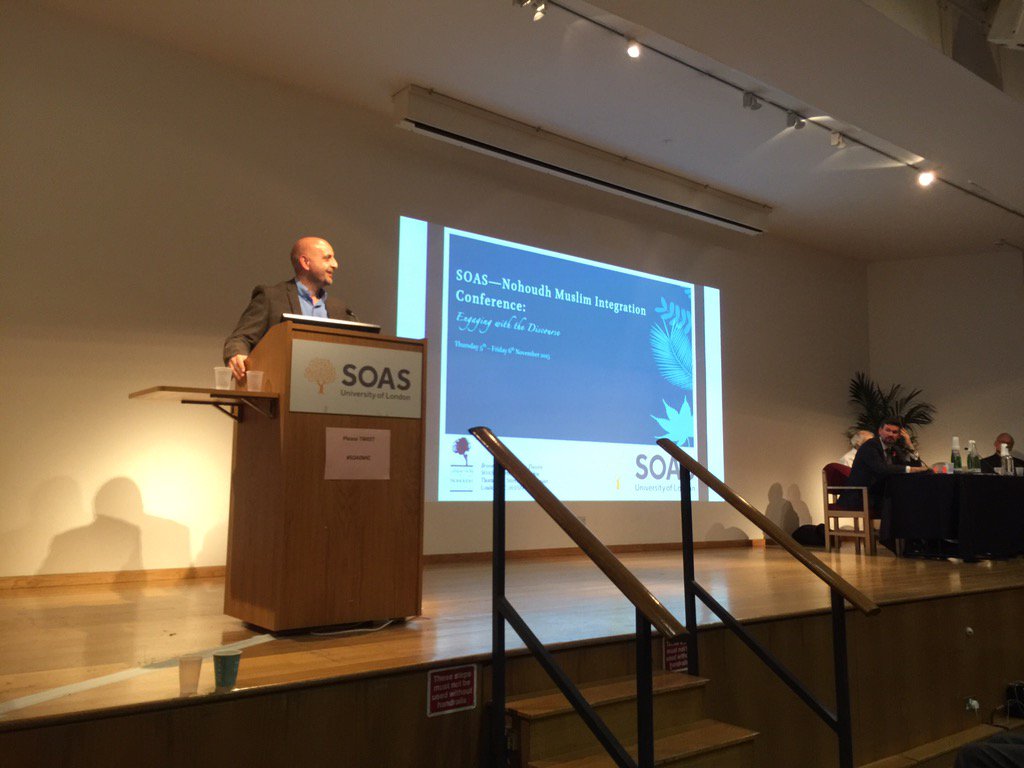
Integration into practice for a mass audience. BBC executive producer on current affairs and was asked to do a series of Islam. Also worked for channel 4.
We need to understand what is going on through filmmakers and journalists and began to look into Inside the Mind of a Suicide Bomber, etc., but the audiences dipped. Why? Because now they want to know why things are going on. They did a documentary on Qur’an and it was a huge success – 2 million viewers. Shows are made for non-Muslims. 1.8 million tuned into the life of the Prophet Muhammad program. These are usually all non-Muslim.
Important role to play is taking into account Christian viewership.
Lack of religious literacy is important. Integration is virtually impossible without religions and cultural literacy. Middle ground of integration needs to understand other faiths. You need knowledge of other faiths and broadcasting is a way to do it.
David Feldman, A Model Minority?
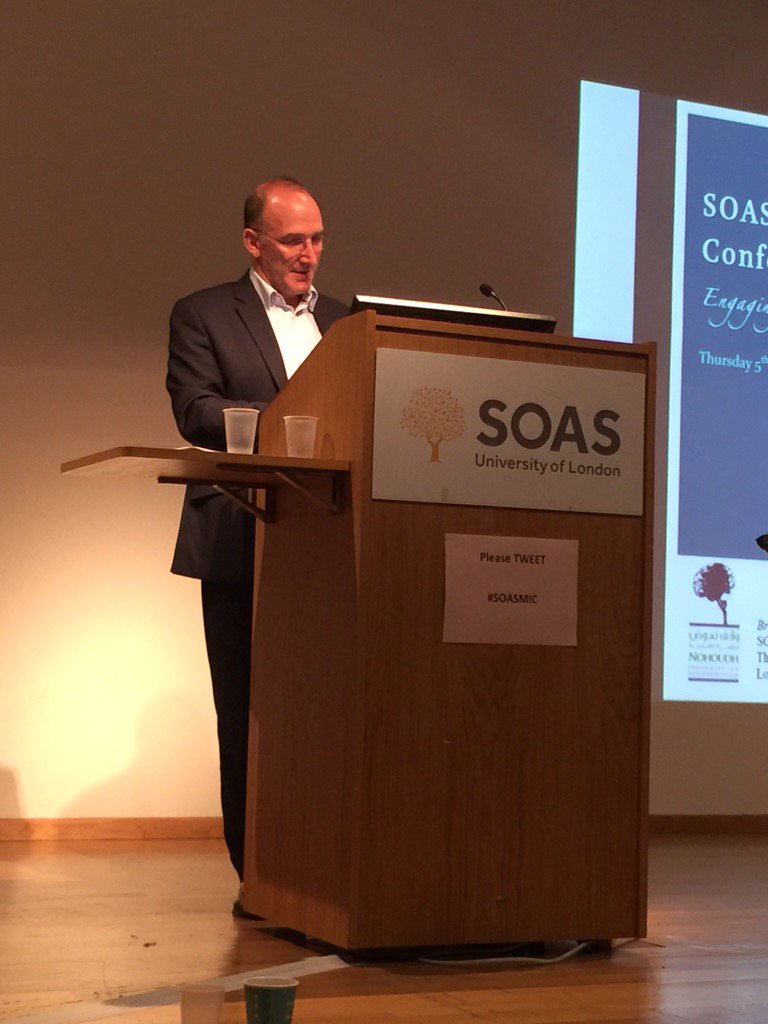
Comparisons between Jewish and Muslim minorities in Britain.
Question of extent to which Jewish experience in UK is an accurate one when we think of Muslims. And also wants to ask what the history of Jews in Britain tells us about integration.
It is a helpful comparison. We’re really dealing with apples and pears. Muslims are much larger and much more diverse than the Jewish population ever was. There was 2.7 Muslims in England and wales. There were only 150 Jewish immigrants who came to the UK around the first WW.
These sects are therefore very different.
The comparison ignores the extent to which Jewish minority is less integrated, not more integrated. E.g. Rise of separist Jewish schooling. 60% of Jewish children now enter Jewish schools. The perception of rising anti-Semitism. 48% of Jews saw anti-Semitism as a big problem. 68 saw it a having risen over last 5 years. Jewish communities used to keep quieter about antisemitism in the past and not they might be more vocal about it. Within the politics of multiculturalism, it’s become a good thing to be a victim. In that sense, Jews are integrating when they complain about Multiculturalism.
Jews are not uniformly integrated. There is not a lot of mixing and high degrees of isolation among Jews but politicians and journalist don’t really care about their lack of integration. Even things like women being advised that they cannot drive.
Difference between Muslim and Jewish population is forcing out Rabbis who promoted Jewish law. Power was used to discipline immigrants.
Political integration. Now Jews seem very well integrated politically. In 1890 they were seen as anarchists. So this is very recent. People were concerned about Irish integration in the past. Now they are not. So it’s all about politics.
Anthony Heath, integration – an assessment
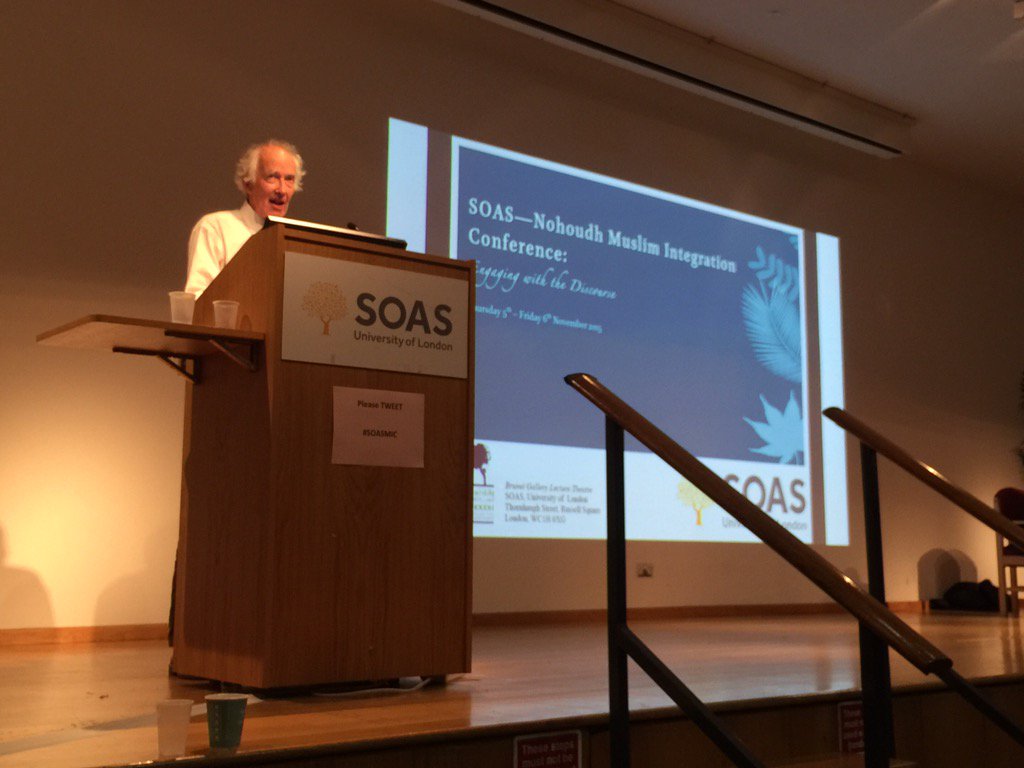
There wasn’t anti-Jewish or Muslim discrimination in the 1940/50s. Only anti Catholic. So there has been a complete transformation in a single lifetime. So why shouldn’t Muslim now have the same status as say Catholics now who were also demonised.
Must make a distinction between integration and assimilation. Integration is not the same as assimilation. There is empirical evidence of integration gaps – like incarceration rates, but this is not unique to Muslims. Poor white British youngsters, for example are poorly integrated.
Integration of Muslims here in the UK is better than any other European country.
Muslims are good at integrating in British society. And we are seeing improvement. Integration is getting better over time.
Sometimes we don’t know what the cause of integration goals are, many policies are a waste of money because they are utterly ineffective. Need to look deeper into the cause.
Bottom line: If we remove the barriers which cause a lack of integration by creating social disadvantages, they will then get better.
